- How it works
Published by Robert Bruce at August 29th, 2023 , Revised On September 5, 2023

Biology Research Topics
Are you in need of captivating and achievable research topics within the field of biology? Your quest for the best biology topics ends right here as this article furnishes you with 100 distinctive and original concepts for biology research, laying the groundwork for your research endeavor.
Table of Contents
Our proficient researchers have thoughtfully curated these biology research themes, considering the substantial body of literature accessible and the prevailing gaps in research.
Should none of these topics elicit enthusiasm, our specialists are equally capable of proposing tailor-made research ideas in biology, finely tuned to cater to your requirements.
Thus, without further delay, we present our compilation of biology research topics crafted to accommodate students and researchers.
Research Topics in Marine Biology
- Impact of climate change on coral reef ecosystems.
- Biodiversity and adaptation of deep-sea organisms.
- Effects of pollution on marine life and ecosystems.
- Role of marine protected areas in conserving biodiversity.
- Microplastics in marine environments: sources, impacts, and mitigation.
Biological Anthropology Research Topics
- Evolutionary implications of early human migration patterns.
- Genetic and environmental factors influencing human height variation.
- Cultural evolution and its impact on human societies.
- Paleoanthropological insights into human dietary adaptations.
- Genetic diversity and population history of indigenous communities.
Biological Psychology Research Topics
- Neurobiological basis of addiction and its treatment.
- Impact of stress on brain structure and function.
- Genetic and environmental influences on mental health disorders.
- Neural mechanisms underlying emotions and emotional regulation.
- Role of the gut-brain axis in psychological well-being.
Cancer Biology Research Topics
- Targeted therapies in precision cancer medicine.
- Tumor microenvironment and its influence on cancer progression.
- Epigenetic modifications in cancer development and therapy.
- Immune checkpoint inhibitors and their role in cancer immunotherapy.
- Early detection and diagnosis strategies for various types of cancer.
Also read: Cancer research topics
Cell Biology Research Topics
- Mechanisms of autophagy and its implications in health and disease.
- Intracellular transport and organelle dynamics in cell function.
- Role of cell signaling pathways in cellular response to external stimuli.
- Cell cycle regulation and its relevance to cancer development.
- Cellular mechanisms of apoptosis and programmed cell death.
Developmental Biology Research Topics
- Genetic and molecular basis of limb development in vertebrates.
- Evolution of embryonic development and its impact on morphological diversity.
- Stem cell therapy and regenerative medicine approaches.
- Mechanisms of organogenesis and tissue regeneration in animals.
- Role of non-coding RNAs in developmental processes.
Also read: Education research topics
Human Biology Research Topics
- Genetic factors influencing susceptibility to infectious diseases.
- Human microbiome and its impact on health and disease.
- Genetic basis of rare and common human diseases.
- Genetic and environmental factors contributing to aging.
- Impact of lifestyle and diet on human health and longevity.
Molecular Biology Research Topics
- CRISPR-Cas gene editing technology and its applications.
- Non-coding RNAs as regulators of gene expression.
- Role of epigenetics in gene regulation and disease.
- Mechanisms of DNA repair and genome stability.
- Molecular basis of cellular metabolism and energy production.
Research Topics in Biology for Undergraduates
- 41. Investigating the effects of pollutants on local plant species.
- Microbial diversity and ecosystem functioning in a specific habitat.
- Understanding the genetics of antibiotic resistance in bacteria.
- Impact of urbanization on bird populations and biodiversity.
- Investigating the role of pheromones in insect communication.
Synthetic Biology Research Topics
- Design and construction of synthetic biological circuits.
- Synthetic biology applications in biofuel production.
- Ethical considerations in synthetic biology research and applications.
- Synthetic biology approaches to engineering novel enzymes.
- Creating synthetic organisms with modified functions and capabilities.
Animal Biology Research Topics
- Evolution of mating behaviors in animal species.
- Genetic basis of color variation in butterfly wings.
- Impact of habitat fragmentation on amphibian populations.
- Behavior and communication in social insect colonies.
- Adaptations of marine mammals to aquatic environments.
Also read: Nursing research topics
Best Biology Research Topics
- Unraveling the mysteries of circadian rhythms in organisms.
- Investigating the ecological significance of cryptic coloration.
- Evolution of venomous animals and their prey.
- The role of endosymbiosis in the evolution of eukaryotic cells.
- Exploring the potential of extremophiles in biotechnology.
Biological Psychology Research Paper Topics
- Neurobiological mechanisms underlying memory formation.
- Impact of sleep disorders on cognitive function and mental health.
- Biological basis of personality traits and behavior.
- Neural correlates of emotions and emotional disorders.
- Role of neuroplasticity in brain recovery after injury.
Biological Science Research Topics:
- Role of gut microbiota in immune system development.
- Molecular mechanisms of gene regulation during development.
- Impact of climate change on insect population dynamics.
- Genetic basis of neurodegenerative diseases like Alzheimer’s.
- Evolutionary relationships among vertebrate species based on DNA analysis.
Biology Education Research Topics
- Effectiveness of inquiry-based learning in biology classrooms.
- Assessing the impact of virtual labs on student understanding of biology concepts.
- Gender disparities in science education and strategies for closing the gap.
- Role of outdoor education in enhancing students’ ecological awareness.
- Integrating technology in biology education: challenges and opportunities.
Biology-Related Research Topics
- The intersection of ecology and economics in conservation planning.
- Molecular basis of antibiotic resistance in pathogenic bacteria.
- Implications of genetic modification of crops for food security.
- Evolutionary perspectives on cooperation and altruism in animal behavior.
- Environmental impacts of genetically modified organisms (GMOs).
Biology Research Proposal Topics
- Investigating the role of microRNAs in cancer progression.
- Exploring the effects of pollution on aquatic biodiversity.
- Developing a gene therapy approach for a genetic disorder.
- Assessing the potential of natural compounds as anti-inflammatory agents.
- Studying the molecular basis of cellular senescence and aging.
Biology Research Topic Ideas
- Role of pheromones in insect mate selection and behavior.
- Investigating the molecular basis of neurodevelopmental disorders.
- Impact of climate change on plant-pollinator interactions.
- Genetic diversity and conservation of endangered species.
- Evolutionary patterns in mimicry and camouflage in organisms.
Biology Research Topics for Undergraduates
- Effects of different fertilizers on plant growth and soil health.
- Investigating the biodiversity of a local freshwater ecosystem.
- Evolutionary origins of a specific animal adaptation.
- Genetic diversity and disease susceptibility in human populations.
- Role of specific genes in regulating the immune response.
Cell and Molecular Biology Research Topics
- Molecular mechanisms of DNA replication and repair.
- Role of microRNAs in post-transcriptional gene regulation.
- Investigating the cell cycle and its control mechanisms.
- Molecular basis of mitochondrial diseases and therapies.
- Cellular responses to oxidative stress and their implications in ageing.
These topics cover a broad range of subjects within biology, offering plenty of options for research projects. Remember that you can further refine these topics based on your specific interests and research goals.
Frequently Asked Questions
What are some good research topics in biology?
A good research topic in biology will address a specific problem in any of the several areas of biology, such as marine biology, molecular biology, cellular biology, animal biology, or cancer biology.
A topic that enables you to investigate a problem in any area of biology will help you make a meaningful contribution.
How to choose a research topic in biology?
Choosing a research topic in biology is simple.
Follow the steps:
- Generate potential topics.
- Consider your areas of knowledge and personal passions.
- Conduct a thorough review of existing literature.
- Evaluate the practicality and viability.
- Narrow down and refine your research query.
- Remain receptive to new ideas and suggestions.
Who Are We?
For several years, Research Prospect has been offering students around the globe complimentary research topic suggestions. We aim to assist students in choosing a research topic that is both suitable and feasible for their project, leading to the attainment of their desired grades. Explore how our services, including research proposal writing , dissertation outline creation, and comprehensive thesis writing , can contribute to your college’s success.
You May Also Like
Welcome to the most comprehensive resource page of climate change research topics, a crucial field of study central to understanding […]
How many universities in Canada? Over 100 private universities and 96 public ones, the top ones include U of T, UBC, and Western University.
A preliminary literature review is an initial exploration of existing research on a topic, setting the foundation for in-depth study.
Ready to place an order?
USEFUL LINKS
Learning resources, company details.
- How It Works
Automated page speed optimizations for fast site performance
200+ Unique And Interesting Biology Research Topics For Students In 2023

Are you curious about the fascinating world of biology and its many research possibilities? Well, you are in the right place! In this blog, we will explore biology research topics, exploring what biology is, what constitutes a good research topic, and how to go about selecting the perfect one for your academic journey.
So, what exactly is biology? Biology is the study of living organisms and their interactions with the environment. It includes everything from the tiniest cells to the largest ecosystems, making it a diverse and exciting field of study.
Stay tuned to learn more about biology research topics as we present over 200 intriguing research ideas for students, emphasizing the importance of selecting the right one. In addition, we will also share resources to make your quest for the perfect topic a breeze. Let’s embark on this scientific journey together!
If you are having trouble with any kind of assignment or task, do not worry—we can give you the best microbiology assignment help at a value price. Additionally, you may look at nursing project ideas .
What Is Biology?
Table of Contents
Biology is the study of living things, like animals, plants, and even tiny organisms too small to see. It helps us understand how these living things work and how they interact with each other and their environment. Biologists, or scientists who study biology, explore topics like how animals breathe, how plants grow, and how our bodies function. By learning about biology, we can better care for the Earth and all its living creatures.
What Is A Good Biology Research Topic?
A good biology research topic is a question or problem in the field of biology that scientists want to investigate and learn more about. It should be interesting and important, like studying how a new medicine can treat a disease or how animals adapt to changing environments. The topic should also be specific and clear, so researchers can focus on finding answers. Additionally, it’s helpful if the topic hasn’t been studied extensively before, so the research can contribute new knowledge to the field of biology and help us better understand the natural world.
Tips For Choosing A Biology Research Topics
Here are some tips for choosing a biology research topics:
1. Choose What Interests You
When picking a biology research topic, go for something that you personally find fascinating and enjoyable. When you’re genuinely curious about it, you’ll be more motivated to study and learn.
2. Select a Significant Topic
Look for a subject in biology that has real-world importance. Think about whether your research can address practical issues, like finding cures for diseases or understanding environmental problems. Research that can make a positive impact is usually a good choice.
3. Check If It’s Doable
Consider if you have the necessary tools and time to carry out your research. It’s essential to pick a topic that you can actually study with the resources available to you.
4. Add Your Unique Perspective
Try to find a fresh or different angle for your research. While you can build upon existing knowledge, bringing something new or unique to the table can make your research more exciting and valuable.
5. Seek Guidance
Don’t hesitate to ask for advice from your teachers or experienced researchers. They can provide you with valuable insights and help you make a smart decision when choosing your research topic in biology.
Biology Research Topics For College Students
1. Investigating the role of genetic mutations in cancer development.
2. Analyzing the impact of climate changes on wildlife populations.
3. Studying the ecology of invasive species in urban environments.
4. Investigating the microbiome of the human gut and its relationship to health.
5. Analyzing the genetic diversity of endangered species for conservation.
6. Studying the evolution of antibiotic resistance in bacteria.
7. Investigating the ecological consequences of deforestation.
8. Analyzing the behavior and communication of social insects like ants and bees.
9. Studying the physiology of extreme environments, such as deep-sea hydrothermal vents.
10. Investigating the molecular mechanisms of cell division and mitosis.
Plant Biology Research Topics For College Students
11. Studying the impact of different fertilizers on crop yields and soil health.
12. Analyzing the genetics of plant resistance to pests and diseases.
13. Investigating the role of plant hormones in growth and development.
14. Studying the adaptation of plants to drought conditions.
15. Analyzing the ecological interactions between plants and pollinators.
16. Investigating the use of biotechnology to enhance crop traits.
17. Studying the genetics of plant breeding for improved varieties.
18. Analyzing the physiology of photosynthesis and carbon fixation in plants.
19. Investigating the effects of soil microbiota on plant health.
20. Studying the evolution of plant species in response to changing environments.
Biotechnology Research Topics For College Students
21. Investigating the use of CRISPR-Cas9 technology for genome editing.
22. Analyzing the production of biofuels from microorganisms.
23. Studying the application of biotechnology in medicine, such as gene therapy.
24. Investigating the use of bioplastics as a sustainable alternative to conventional plastics.
25. Analyzing the role of biotechnology in food production, including GMOs.
26. Studying the development of biopharmaceuticals and monoclonal antibodies.
27. Investigating the use of bioremediation to clean up polluted environments.
28. Studying the potential of synthetic biology for creating novel organisms.
29. Analyzing the ethical and social implications of biotechnological advancements.
30. Investigating the use of biotechnology in forensic science, such as DNA analysis.
Molecular Biology Research Topics For Undergraduates
31. Studying the structure and function of DNA and RNA molecules.
32. Analyzing the regulation of gene expression in eukaryotic cells.
33. Investigating the mechanisms of DNA replication and repair.
34. Studying the role of non-coding RNAs in gene regulation.
35. Analyzing the molecular basis of genetic diseases like cystic fibrosis.
36. Investigating the epigenetic modifications that control gene activity.
37. Studying the molecular mechanisms of protein folding and misfolding.
38. Analyzing the molecular pathways involved in cancer progression.
39. Investigating the molecular basis of neurodegenerative diseases.
40. Studying the use of molecular markers in genetic diversity analysis.
Life Science Research Topics For High School Students
41. Investigating the effects of different diets on human health.
42. Analyzing the impact of exercise on cardiovascular fitness.
43. Studying the genetics of inherited traits and diseases.
44. Investigating the ecological interactions in a local ecosystem.
45. Analyzing the diversity of microorganisms in soil or water samples.
46. Studying the anatomy and physiology of a specific organ or system.
47. Investigating the life cycle of a local plant or animal species.
48. Studying the effects of environmental pollutants on aquatic organisms.
49. Analyzing the behavior of a specific animal species in its habitat.
50. Investigating the process of photosynthesis in plants.
Biology Research Topics For Grade 12
51. Investigating the genetic basis of a specific inherited disorder.
52. Analyzing the impact of climate change on a local ecosystem.
53.Studying the biodiversity of a particular rainforest region.
54. Investigating the physiological adaptations of animals to extreme temperatures.
55. Analyzing the effects of pollution on aquatic ecosystems.
56. Studying the life history and conservation status of an endangered species.
57. Investigating the molecular mechanisms of a specific disease.
58. Studying the ecological interactions within a coral reef ecosystem.
59. Analyzing the genetics of plant hybridization and speciation.
60. Investigating the behavior and communication of a particular bird species.
Marine Biology Research Topics
61. Studying the impact of ocean acidification on coral reefs.
62. Analyzing the migration patterns of marine mammals.
63. Investigating the physiology of deep-sea creatures under high pressure.
64. Studying the ecology of phytoplankton and their role in the marine food web.
65. Analyzing the behavior of different species of sharks.
66. Investigating the conservation of sea turtle populations.
67. Studying the biodiversity of deep-sea hydrothermal vent communities.
68. Analyzing the effects of overfishing on marine ecosystems.
69. Investigating the adaptation of marine organisms to extreme cold in polar regions.
70. Studying the bioluminescence and communication in marine organisms.
AP Biology Research Topics
71. Investigating the role of specific enzymes in cellular metabolism.
72. Analyzing the genetic variation within a population.
73. Studying the mechanisms of hormonal regulation in animals.
74. Investigating the principles of Mendelian genetics through trait analysis.
75. Analyzing the ecological succession in a local ecosystem.
76. Studying the physiology of the human circulatory system.
77. Investigating the molecular biology of a specific virus.
78. Studying the principles of natural selection through evolutionary simulations.
79. Analyzing the genetic diversity of a plant species in different habitats.
80. Investigating the effects of different environmental factors on plant growth.
Cell Biology Research Topics
81. Investigating the role of mitochondria in cellular energy production.
82. Analyzing the mechanisms of cell division and mitosis.
83. Studying the function of cell membrane proteins in signal transduction.
84. Investigating the cellular processes involved in apoptosis (cell death).
85. Analyzing the role of endoplasmic reticulum in protein synthesis and folding.
86. Studying the dynamics of the cytoskeleton and cell motility.
87. Investigating the regulation of cell cycle checkpoints.
88. Analyzing the structure and function of cellular organelles.
89. Studying the molecular mechanisms of DNA replication and repair.
90. Investigating the impact of cellular stress on cell health and function.
Human Biology Research Topics
91. Analyzing the genetic basis of inherited diseases in humans.
92. Investigating the physiological responses to exercise and physical activity.
93. Studying the hormonal regulation of the human reproductive system.
94. Analyzing the impact of nutrition on human health and metabolism.
95. Investigating the role of the immune system in disease prevention.
96. Studying the genetics of human evolution and migration.
97. Analyzing the neural mechanisms underlying human cognition and behavior.
98. Investigating the molecular basis of aging and age-related diseases.
99. Studying the impact of environmental toxins on human health.
100. Analyzing the genetics of organ transplantation and tissue compatibility.
Molecular Biology Research Topics
101. Investigating the role of microRNAs in gene regulation.
102. Analyzing the molecular basis of genetic disorders like cystic fibrosis.
103. Studying the epigenetic modifications that control gene expression.
104. Investigating the molecular mechanisms of RNA splicing.
105. Analyzing the role of telomeres in cellular aging.
106. Studying the molecular pathways involved in cancer metastasis.
107. Investigating the molecular basis of neurodegenerative diseases.
108. Studying the molecular interactions in protein-protein networks.
109. Analyzing the molecular mechanisms of DNA damage and repair.
110. Investigating the use of CRISPR-Cas9 for genome editing.
Animal Biology Research Topics
111. Studying the behavior and communication of social insects like ants.
112. Analyzing the physiology of hibernation in mammals.
113. Investigating the ecological interactions in a predator-prey relationship.
114. Studying the adaptations of animals to extreme environments.
115. Analyzing the genetics of inherited traits in animal populations.
116. Investigating the impact of climate change on animal migration patterns.
117. Studying the diversity of marine life in coral reef ecosystems.
118. Analyzing the physiology of flight in birds and bats.
119. Investigating the molecular basis of animal coloration and camouflage.
120. Studying the behavior and conservation of endangered species.
- Neuroscience Research Topics
- Mental Health Research Topics
Plant Biology Research Topics
121. Investigating the role of plant hormones in growth and development.
122. Analyzing the genetics of plant resistance to pests and diseases.
123. Climate change and plant phenology are being examined.
124. Investigating the ecology of mycorrhizal fungi and their symbiosis with plants.
125. Investigating plant photosynthesis and carbon fixing.
126. Molecular analysis of plant stress responses.
127. Investigating the adaptation of plants to drought conditions.
128. Studying the role of plants in phytoremediation of polluted environments.
129. Analyzing the genetics of plant hybridization and speciation.
130. Investigating the molecular basis of plant-microbe interactions.
Environmental Biology Research Topics
131. Analyzing the effects of pollution on aquatic ecosystems.
132. Investigating the biodiversity of a particular ecosystem.
133. Studying the ecological consequences of deforestation.
134. Analyzing the impact of climate change on wildlife populations.
135. Investigating the use of bioremediation to clean up polluted sites.
136. Studying the environmental factors influencing species distribution.
137. Analyzing the effects of habitat fragmentation on wildlife.
138. Investigating the ecology of invasive species in new environments.
139. Studying the conservation of endangered species and habitats.
140. Analyzing the interactions between humans and urban ecosystems.
Chemical Biology Research Topics
141. Investigating the design and synthesis of new drug compounds.
142. Analyzing the molecular mechanisms of enzyme catalysis.
143.Studying the role of small molecules in cellular signaling pathways.
144. Investigating the development of chemical probes for biological research.
145. Studying the chemistry of protein-ligand interactions.
146. Analyzing the use of chemical biology in cancer therapy.
147. Investigating the synthesis of bioactive natural products.
148. Studying the role of chemical compounds in microbial interactions.
149. Analyzing the chemistry of DNA-protein interactions.
150. Investigating the chemical basis of drug resistance in pathogens.
Medical Biology Research Topics
151. Investigating the genetic basis of specific diseases like diabetes.
152. Analyzing the mechanisms of drug resistance in bacteria.
153. Studying the molecular mechanisms of autoimmune diseases.
154. Investigating the development of personalized medicine approaches.
155. Studying the role of inflammation in chronic diseases.
156. Analyzing the genetics of rare diseases and genetic syndromes.
157. Investigating the molecular basis of viral infections and vaccines.
158. Studying the mechanisms of organ transplantation and rejection.
159. Analyzing the molecular diagnostics of cancer.
160. Investigating the biology of stem cells and regenerative medicine.
Evolutionary Biology Research Topics
161. Studying the evolution of human ancestors and early hominids.
162. The genetic variety of species and between species is being looked at.
163. Investigating the role of sexual selection in animal evolution.
164. Studying the co-evolutionary relationships between parasites and hosts.
165. Analyzing the evolutionary adaptations of extremophiles.
166. Investigating the evolution of developmental processes (evo-devo).
167. Studying the biogeography and distribution of species.
168. Analyzing the evolution of mimicry in animals and plants.
169. Investigating the genetics of speciation and hybridization.
170. Studying the evolutionary history of domesticated plants and animals.
Cellular Biology Research Topics
171. Investigating the role of autophagy in cellular homeostasis.
172. Analyzing the mechanisms of cellular transport and trafficking.
173. Studying the regulation of cell adhesion & migration.
174. Investigating the cellular responses to DNA damage.
175. Analyzing the dynamics of cellular membrane structures.
176. Studying the role of cellular organelles in lipid metabolism.
177. Investigating the molecular mechanisms of cell-cell communication.
178. Studying the physiology of cellular respiration and energy production.
179. Analyzing the cellular mechanisms of viral entry and replication.
180. Investigating the role of cellular senescence in aging and disease.
Good Biology Research Topics Related To Brain Injuries
181. Analyzing the molecular mechanisms of traumatic brain injury.
182. Investigating the role of neuroinflammation in brain injury recovery.
183. Studying the impact of concussions on long-term brain health.
184. Analyzing the use of neuroimaging in diagnosing brain injuries.
185. Investigating the development of neuroprotective therapies.
186. Studying the genetics of susceptibility to brain injuries.
187. Analyzing the cognitive and behavioral effects of brain trauma.
188. Investigating the role of rehabilitation in brain injury recovery.
189. Studying the cellular and molecular changes in axonal injury.
190. Looking into how stem cell therapy might be used to help brain injuries.
Biology Quantitative Research Topics
191. Investigating the mathematical modeling of population dynamics.
192. Analyzing the statistical methods for biodiversity assessment.
193. Studying the use of bioinformatics in genomics research.
194. Investigating the quantitative analysis of gene expression data.
195. Studying the mathematical modeling of enzyme kinetics.
196. Analyzing the statistical approaches for epidemiological studies.
197. Investigating the use of computational tools in phylogenetics.
198. Studying the mathematical modeling of ecological systems.
199. Analyzing the quantitative analysis of protein-protein interactions.
200. Investigating the statistical methods for analyzing genetic variation.
Importance Of Choosing The Right Biology Research Topics
Here are some importance of choosing the right biology research topics:
1. Relevance to Your Interests and Goals
Choosing the right biology research topic is important because it should align with your interests and goals. Studying something you’re passionate about keeps you motivated and dedicated to your research.
2. Contribution to Scientific Knowledge
Your research should contribute something valuable to the world of science. Picking the right topic means you have the chance to discover something new or solve a problem, advancing our understanding of the natural world.
3. Availability of Resources
Consider the resources you have or can access. If you pick a topic that demands resources you don’t have, your research may hit a dead end. Choosing wisely means you can work efficiently.
4. Feasibility and Manageability
A good research topic should be manageable within your time frame and capabilities. If it’s too broad or complex, you might get overwhelmed. Picking the right topic ensures your research is doable.
5. Real-World Impact
Think about how your research might benefit the real world. Biology often has implications for health, the environment, or society. Choosing a topic with practical applications can make your work meaningful and potentially change lives.
Resources For Finding Biology Research Topics
There are numerous resources for finding biology research topics:
1. Online Databases
Look on websites like PubMed and Google Scholar. They have lots of biology articles. Type words about what you like to find topics.
2. Academic Journals
Check biology magazines. They talk about new research. You can find ideas and see what’s important.
3. University Websites
Colleges show what their teachers study. Find teachers who like what you like. Ask them about ideas for your own study.
4. Science News and Magazines
Read science news. They tell you about new things in biology. It helps you think of research ideas.
5. Join Biology Forums and Communities
Talk to other people who like biology online. You can ask for ideas and find friends to help you. Use websites like ResearchGate and Reddit for this.
Conclusion
Biology Research Topics offer exciting opportunities for exploration and learning. We’ve explained what biology is and stressed the importance of picking a good research topic. Our tips and extensive list of over 200 biology research topics provide valuable guidance for students.
Selecting the right topic is more than just getting good grades; it’s about making meaningful contributions to our understanding of life. We’ve also shared resources to help you discover even more topics. So, embrace the world of biology research, embark on a journey of discovery, and be part of the ongoing effort to unravel the mysteries of the natural world.
Related Posts

Step by Step Guide on The Best Way to Finance Car

The Best Way on How to Get Fund For Business to Grow it Efficiently
49 Most Interesting Biology Research Topics
August 21, 2023

In need of the perfect biology research topics—ideas that can both showcase your intellect and fuel your academic success? Lost in the boundless landscape of possible biology topics to research? And afraid you’ll never get a chance to begin writing your paper, let alone finish writing? Whether you’re a budding biologist hoping for a challenge or a novice seeking easy biology research topics to wade into, this blog offers curated and comprehensible options.
And if you’re a high school or transfer student looking for opportunities to immerse yourself in biology, consider learning more about research opportunities for high school students , top summer programs for high school students , best colleges for studying biomedical engineering , and best colleges for studying biology .
What is biology?
Well, biology explores the web of life that envelops our planet, from the teeny-tiny microbes to the big complex ecosystems. Biology investigates the molecular processes that define existence, deciphers the interplay of genes, and examines all the dynamic ways organisms interact with their environments. And through biology, you can gain not only knowledge, but a deeper appreciation for the interconnectedness of all living things. Pretty cool!
There are lots and lots of sub-disciplines within biology, branching out in all directions. Throughout this list, we won’t follow all of those branches, but we will follow many. And while none of these branches are truly simple or easy, some might be easier than others. Now we’ll take a look at a few various biology research topics and example questions that could pique your curiosity.
Climate change and ecosystems
The first of our potentially easy biology research topics: climate change and ecosystems. Investigate how ecosystems respond and adapt to the changing climate. And learn about shifts in species distributions , phenology , and ecological interactions .
1) How are different ecosystems responding to temperature changes and altered precipitation patterns?2) What are the implications of shifts in species distributions for ecosystem stability and functioning?
2) Or how does phenology change in response to climate shifts? And how do those changes impact species interactions?
3) Which underlying genetic and physiological mechanisms enable certain species to adapt to changing climate conditions?
4) And how do changing climate conditions affect species’ abilities to interact and form mutualistic relationships within ecosystems?
Microbiome and human health
Intrigued by the relationship between the gut and the rest of the body? Study the complex microbiome . You could learn how gut microbes influence digestion, immunity, and even mental health.
5) How do specific gut microbial communities impact nutrient absorption?
6) What are the connections between the gut microbiome, immune system development, and susceptibility to autoimmune diseases?
7) What ethical considerations need to be addressed when developing personalized microbiome-based therapies? And how can these therapies be safely and equitably integrated into clinical practice?
8) Or how do variations in the gut microbiome contribute to mental health conditions such as anxiety and depression?
9) How do changes in diet and lifestyle affect the composition and function of the gut microbiome? And what are the subsequent health implications?
Urban biodiversity conservation
Next, here’s another one of the potentially easy biology research topics. Examine the challenges and strategies for conserving biodiversity in urban environments. Consider the impact of urbanization on native species and ecosystem services. Then investigate the decline of pollinators and its implications for food security or ecosystem health.
10) How does urbanization influence the abundance and diversity of native plant and animal species in cities?
11) Or what are effective strategies for creating and maintaining green spaces that support urban biodiversity and ecosystem services?
12) How do different urban design and planning approaches impact the distribution of wildlife species and their interactions?
13) What are the best practices for engaging urban communities in biodiversity conservation efforts?
14) And how can urban agriculture and rooftop gardens contribute to urban biodiversity conservation while also addressing food security challenges?
Bioengineering
Are you a problem solver at heart? Then try approaching the intersection of engineering, biology, and medicine. Delve into the field of synthetic biology , where researchers engineer biological systems to create novel organisms with useful applications.
15) How can synthetic biology be harnessed to develop new, sustainable sources of biofuels from engineered microorganisms?
16) And what ethical considerations arise when creating genetically modified organisms for bioremediation purposes?
17) Can synthetic biology techniques be used to design plants that are more efficient at withdrawing carbon dioxide from the atmosphere?
18) How can bioengineering create organisms capable of producing valuable pharmaceutical compounds in a controlled and sustainable manner?
19) But what are the potential risks and benefits of using engineered organisms for large-scale environmental cleanup projects?
Neurobiology
Interested in learning more about what makes creatures tick? Then this might be one of your favorite biology topics to research. Explore the neural mechanisms that underlie complex behaviors in animals and humans. Shed light on topics like decision-making, social interactions, and addiction. And investigate how brain plasticity and neurogenesis help the brain adapt to learning, injury, and aging.
20) How does the brain’s reward circuitry influence decision-making processes in situations involving risk and reward?
21) What neural mechanisms underlie empathy and social interactions in both humans and animals?
22) Or how do changes in neural plasticity contribute to age-related cognitive decline and neurodegenerative diseases?
23) Can insights from neurobiology inform the development of more effective treatments for addiction and substance abuse?
24) What are the neural correlates of learning and memory? And how can our understanding of these processes be applied to educational strategies?
Plant epigenomics
While this might not be one of the easy biology research topics, it will appeal to plant enthusiasts. Explore how epigenetic modifications in plants affect their ability to respond and adapt to changing environmental conditions.
25) How do epigenetic modifications influence the expression of stress-related genes in plants exposed to temperature fluctuations?
26) Or what role do epigenetic changes play in plants’ abilities to acclimate to changing levels of air pollution?
27) Can certain epigenetic modifications be used as indicators of a plant’s adaptability to new environments?
28) How do epigenetic modifications contribute to the transgenerational inheritance of traits related to stress resistance?
29) And can targeted manipulation of epigenetic marks enhance crop plants’ ability to withstand changing environmental conditions?
Conservation genomics
Motivated to save the planet? Conservation genomics stands at the forefront of modern biology, merging the power of genetics with the urgent need to protect Earth’s biodiversity. Study genetic diversity, population dynamics, and how endangered species adapt in response to environmental changes.
30) How does genetic diversity within endangered species influence their ability to adapt to changing environmental conditions?
31) What genetic factors contribute to the susceptibility of certain populations to diseases, and how can this knowledge inform conservation strategies?
32) How can genomic data be used to inform captive breeding and reintroduction programs for endangered species?
33) And what are the genomic signatures of adaptation in response to human-induced environmental changes, such as habitat fragmentation and pollution?
34) Or how can genomics help identify “hotspots” of biodiversity that are particularly important for conservation efforts?
Zoonotic disease transmission
And here’s one of the biology research topics that’s been on all our minds in recent years. Investigate the factors contributing to the transmission of zoonotic diseases , like COVID-19. Then posit strategies for prevention and early detection.
35) What are the ecological and genetic factors that facilitate the spillover of zoonotic pathogens from animals to humans?
36) Or how do changes in land use, deforestation, and urbanization impact the risk of zoonotic disease emergence?
37) Can early detection and surveillance systems be developed to predict and mitigate the spread of zoonotic diseases?
38) How do social and cultural factors influence human behaviors that contribute to zoonotic disease transmission?
39) And can strategies be implemented to improve global pandemic preparedness?
Bioinformatics
Are you a data fanatic? Bioinformatics involves developing computational tools and techniques to analyze and interpret large biological datasets. This enables advancements in genomics, proteomics, and systems biology. So delve into the world of bioinformatics to learn how large-scale genomic and molecular data are revolutionizing biological research.
40) How can machine learning algorithms predict the function of genes based on their DNA sequences?
41) And what computational methods can identify potential drug targets by analyzing protein-protein interactions in large biological datasets?
42) Can bioinformatics tools be used to identify potential disease-causing mutations in human genomes and guide personalized medicine approaches?
43) What are the challenges and opportunities in analyzing “omics” data (genomics, proteomics, transcriptomics) to uncover novel biological insights?
44) Or how can bioinformatics contribute to our understanding of microbial diversity, evolution, and interactions within ecosystems?
Regenerative medicine
While definitely not one of the easy biology research topics, regenerative medicine will appeal to those interested in healthcare. Research innovative approaches to stimulate tissue and organ regeneration, using stem cells, tissue engineering, and biotechnology. And while you’re at it, discover the next potential medical breakthrough.
45) How can stem cells be directed to differentiate into specific cell types for tissue regeneration, and what factors influence this process?
46) Or what are the potential applications of 3D bioprinting in creating functional tissues and organs for transplantation?
47) How can bioengineered scaffolds enhance tissue regeneration and integration with host tissues?
48) What are the ethical considerations surrounding the use of stem cells and regenerative therapies in medical treatments?
49) And can regenerative medicine approaches be used to treat neurodegenerative disorders and restore brain function?
Biology Research Topics – Final thoughts
So as you take your next steps, try not to feel overwhelmed. And instead, appreciate the vast realm of possibilities that biology research topics offer. Because the array of biology topics to research is as diverse as the ecosystems it seeks to understand. And no matter if you’re only looking for easy biology research topics, or you’re itching to unravel the mysteries of plant-microbe interactions, your exploration will continue to deepen what we know of the world around us.
- High School Success

Mariya holds a BFA in Creative Writing from the Pratt Institute and is currently pursuing an MFA in writing at the University of California Davis. Mariya serves as a teaching assistant in the English department at UC Davis. She previously served as an associate editor at Carve Magazine for two years, where she managed 60 fiction writers. She is the winner of the 2015 Stony Brook Fiction Prize, and her short stories have been published in Mid-American Review , Cutbank , Sonora Review , New Orleans Review , and The Collagist , among other magazines.
- 2-Year Colleges
- Application Strategies
- Best Colleges by Major
- Best Colleges by State
- Big Picture
- Career & Personality Assessment
- College Essay
- College Search/Knowledge
- College Success
- Costs & Financial Aid
- Dental School Admissions
- Extracurricular Activities
- Graduate School Admissions
- High Schools
- Law School Admissions
- Medical School Admissions
- Navigating the Admissions Process
- Online Learning
- Private High School Spotlight
- Summer Program Spotlight
- Summer Programs
- Test Prep Provider Spotlight

“Innovative and invaluable…use this book as your college lifeline.”
— Lynn O'Shaughnessy
Nationally Recognized College Expert
College Planning in Your Inbox
Join our information-packed monthly newsletter.
I am a... Student Student Parent Counselor Educator Other First Name Last Name Email Address Zip Code Area of Interest Business Computer Science Engineering Fine/Performing Arts Humanities Mathematics STEM Pre-Med Psychology Social Studies/Sciences Submit
- How It Works
- PhD thesis writing
- Master thesis writing
- Bachelor thesis writing
- Dissertation writing service
- Dissertation abstract writing
- Thesis proposal writing
- Thesis editing service
- Thesis proofreading service
- Thesis formatting service
- Coursework writing service
- Research paper writing service
- Architecture thesis writing
- Computer science thesis writing
- Engineering thesis writing
- History thesis writing
- MBA thesis writing
- Nursing dissertation writing
- Psychology dissertation writing
- Sociology thesis writing
- Statistics dissertation writing
- Buy dissertation online
- Write my dissertation
- Cheap thesis
- Cheap dissertation
- Custom dissertation
- Dissertation help
- Pay for thesis
- Pay for dissertation
- Senior thesis
- Write my thesis
212 Unique Biology Research Topics For Students And Researchers
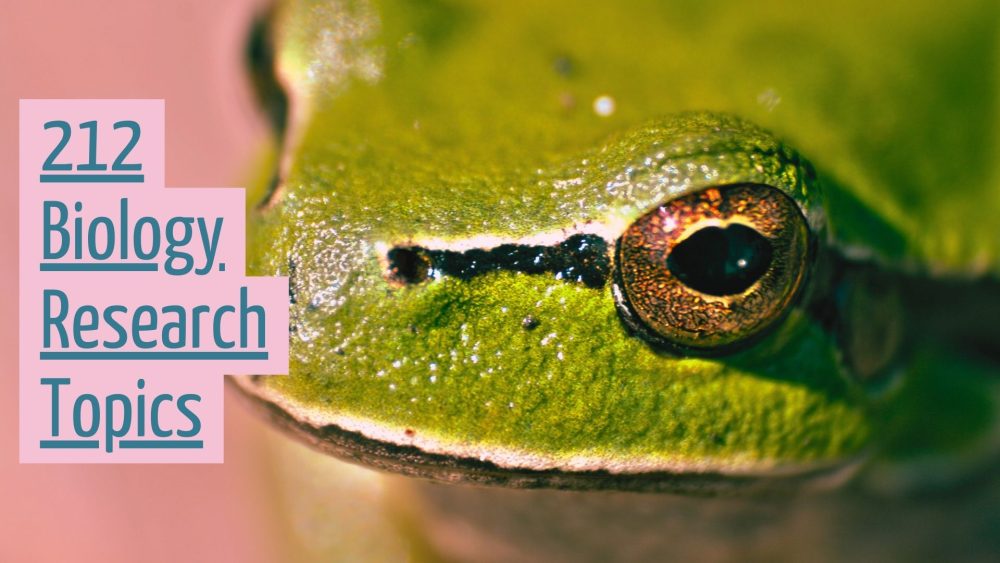
Every student studying something related to biology — botany, marine, animal, medicine, molecular or physical biology, is in an interesting field. It’s a subject that explores how animate and inanimate objects relate to themselves. The field unveils the past, the present, and what lies in the future of the relationship between the living and nonliving things.
This is precisely why you need custom and quality biology topics for your college and university essay or project. It’ll make it easy to brainstorm, research, and get to writing straight away. Before the deep dive, what is biology?
What Is Biology?
Everyone knows it’s the scientific study of life, but beyond that, biology facilitates the comprehension of living and nonliving things. It’s a branch that explores their anatomy, behavior, distribution, morphology, and physiology.
For example, it understands how genes are classified and constituted into generations. It encompasses various branches, including botany, medicine, genetics, ecology, marine biology, zoology, and molecular biology.
Here are what some of these mean:
Botany: This study of plants examines their structure, physiology, ecology, economic importance, and distribution, among others. It also deals with their biochemical processes, properties, and social interactions between plants. It extends to how plants are vital for human life, survival, and growth and how they play a significant role in stabilizing environmental health. Zoology: Zoology studies animal behavior, brain, structure, physiology, class, and distribution. It’s the general study of the lives of both living and extinct animals. It explains animal classification, the animal kingdom, evolution, habitat, embryology, and life span. Physiology: Physiology deals with the daily functions of the human body: How it works and the factors that make it work. It examines molecular behavior, the chemistry and physics behind locomotion, and how the cells in the living organisms’ body function. It helps understand how humans and animals get sick and what can be done to alleviate pain. Microbiology: Dealing with microorganisms, it examined how viruses, algae, fungi, bacteria, protozoa, and slime molds become parts of human life. They’re regarded as microbes, which play substantial roles in the human biochemical processes, including climate change, biodegradation, biodeterioration, food spoilage, biotech, and epidemiology. Marine Biology: This is the scientific study of organs in the sea. It understands their family classification, how they survive, and what makes wild marine animals different from domesticated and consumable ones. It also explores their interaction with the environment through several processes. The marine biologist studies marines in their natural environment, collects data on their characteristics, human impact on their living, and how they relate with themselves.
Now that you know all these, here are some custom biology topics to research for your university or college essay and paper.
Controversial Biology Topics
There are many controversial subjects in every field, and biology isn’t exempt from controversy. If you’d like to create an original essay through diverse opinions, here are biology topics for you:
- What are your thoughts on the post-Roe V Wade world?
- How can the post-Roe V Wade policy affect developing countries looking up to America for their laws?
- Abortion and feminism: discuss
- Does saving life justify cloning?
- Explain the principle of abortion in medical practice
- The effects of cloning in medicine
- How does genetics contribute to obesity?
- Explain why a parent could have Hepatitis B virus and only one of five offspring have the virus
- Is homosexuality really in the gene?
- How does depression correlate with genetics?
- Additives and how they affect the genes
- Examine how genetic mutations work
- Discuss the grounds that you could prove for legalizing human cloning
- Which is more immoral: Human or animal cloning?
- How is nanotechnology different from biotechnology?
- Discuss the manifestation of nanotechnology in science
- Explain three instances where public opinion has held back scientific inventions
- How does transgenic crop work?
- Would you say genetically modified food is safe for consumption?
- Explain why sexual abuse leads to trauma.
Biology Research Paper Topics
You’d need to write an extensive paper on biology one day. This could be when you’re in your final year in college or the university or submitting to a competition. You’d need Biology topics to research for brainstorming, and here are 30 of them:
- Stem cells and tissue formation processes
- Why are there different congenital disabilities?
- Mixtures in anticancer drugs?
- What are the complexities of existing HIV drugs?
- What is the contribution of chemotherapy to cancer?
- Examine the chemotherapy process and why it doesn’t work for some patients.
- Explain the origin of developmental diseases
- How do germs affect the cells?
- What are the consequences of the sun on the white person’s and black person’s skin?
- Why are some diseases treatable through drugs while some are not?
- Scientific lessons learned from COVID-19 and ideas to tackle the next virus
- If animals are carriers of the virus, what should be done to them?
- Examine five animals in extinction and what led to it
- Discuss the subject of endangered species and why people should care
- Is a plant-based diet sustainable for human health?
- Account for the consequence of living on Mars on human health
- Discuss the inconveniences involved in space travel
- How does space flight contribute to environmental disasters
- Discuss the emergence of leukemia
- Explain how the immune systems in humans work
- Evaluate the factors that weaken the immunological system
- What would you consider the deadliest virus?
- Autoimmune: what is it, origin and consequences
- Immune disorder: origin and how it affects the body
- Does stress affect the ability to have sex?
- Contribution of vaccine to eradicating disease: Discuss
- What are the complexities in taking the Hepatitis B vaccine while being positive?
- Allergies: why do humans have them?
- DNA modification: how does it work?
- Explain the misconceptions about the COVID-19 vaccines.
Interesting Biology Topics
Biology doesn’t have to be boring. Different aspects of biology could be fun to explore, especially if you’ve had a flair for the study since your elementary school classes.
You can either write an essay or paper with the following interesting biology research topics:
- Human emotions and conflicts with their intellectual intelligence
- Emotions: Its influence on art and music and how the perception of art influences the world
- The consequences of marijuana and alcohol on teenagers
- Compare and contrast how alcohol affects teenagers and adults
- Discuss the contributions of neuroscience to the subject of emotional pain
- Explain how the brain process speech
- Discuss the factors that cause autism
- Explain what is meant when people say humans are animals
- Why do scientists say humans are pessimists?
- Factors contributing to the dopamine levels human experience
- How does isolation affect the human brain?
- What factors contribute to instinctive responses?
- Noise pollution: how it affects living organisms
- Fire ecology: The contributions of plants to fire outbreak
- Explain the science behind how hot temperature, soil, and dry grass start a fire
- Microbes: what do you understand by bioremediation?
- Explain urban ecology and the challenges it pokes to solve
- Discuss how excessive internet usage affects the human memory
- Evaluate how conservation biology contributes to the extinction prevention efforts
- Discuss the role of satellites and drones in understanding the natural world
- Why do we need space travel and studies?
- Explain the limitations of limnology studies
- What are infectious-disease-causing agents all about?
- Discuss what epigenetics studies encompass
- Why is cancer research essential to the world?
- Discuss climate change: Governments are not interested, and there is no alternative
- How is behavioral science studies a core part of the understanding of the world?
- Discuss the issues with genetic engineering and why it’s a challenge
- Evaluate the strengths and weaknesses in the arguments for a plant-based diet
- Create a survey amongst students of biology asking why they chose to study the course.
Biology Research Topics For College Students
If you find any of the above beyond your intellectual and Research capacity, here are some topics you can handle. You can use these for your essays, projects, quizzes, or competitions.
These custom yet popular biology research topics will examine famous personalities and other discourse in biology:
- Effects of the human hormone on the mind
- Why do men get erect even when they’re absentminded?
- How does women’s arousal work?
- How can melatonin be valuable for therapy?
- Risky behavior: Hormones responsible for the risk
- Stem and cloning: what is the latest research on the subject?
- Hormones: changes in pregnancy
- Why do pregnant women have an appetite for random and remote things?
- The role of physical activities in hormone development
- Examine the benefits and threats of transgenic crops
- The fight against COVID-19: assess current successes
- The fight against smallpox: assess current successes
- The fight against HIV: history, trends, and present research
- Discuss the future of prosthetic appliances
- Examine the research and the future of mind-controlled limbs
- What does cosmetic surgery mean, and why is it needed?
- Analyze the meaning and process of vascular surgery
- Discuss the debate around changes in genital organs for males and females in transgender bodies
- How do donors and organ transplants work?
- Account for the work of Dr. Malcom E Miller
- Discuss the contribution of Charles Darwin to human evolution
- Explain the trends in biomedicine
- Discuss the functions of x-rays in botany
- Assess the most efficient systems for wildlife preservation
- Examine how poverty contributes to climate hazards
- Discuss the process involved in plant metabolism
- The transformation of energy into a living thing: discuss
- Prevention for sexually transmitted disease: What are the misconceptions?
- Analyze how the human body reacts to poison
- Russian Poisoning: What are the lessons scientists must learn?
- COVID-19: Discuss the efforts by two or three governments to prevent the spread
- Discuss the contributions of Pfizer during the pandemic.
Marine Biology Research Topics
This subject explains orgasms in the sea, how they survive, and their interaction with their environment. If you have a flair for this field, the following Biology research topics may interest you:
- Discuss what quantitative ecology through modeling means
- Smallest diatoms and marine logistics: discuss
- How is the shark studied?
- Acidification of seas: Causes and consequences
- Discuss the concept of the immortality of Jellyfishes
- Discuss the differences between seawater and freshwater in marine study
- Account for some of the oldest marine species
- Discuss the evolution of the deep sea
- Explain whales’ communication techniques
- What does plankton ecology encompass?
- The importance of coral reefs to seawater
- Challenges that encompass geological oceanography
- How tourism affects natural animal habitat
- Discuss some instances of the domestication of wild marine animals
- Coastal zone: pros and cons of living in such areas
- How do sharks perceive enemies?
- Analyze why some animals can live in water but can’t live on land
- Explain how plants survive in the sea
- Compare and contrast the different two species of animals in the water
- How can marine energy be generated, stored, and used?
Molecular Biology Research Topics
Focusing on the construct of cells and analysis of their composition, it understands the alteration and maintenance of cellular processes. If you’d like to focus on molecular biology, here are 15 good biology research topics for you:
- Ethical considerations in molecular genetics
- Discuss the structure and component of the gene
- Examine the restrictions in DNA
- What are the peculiarities in modern nucleic acid analysis
- What goes into the Pharmaceutical production of drugs
- Evaluate the building blocks of life
- Discuss the systems of RNA translation to protein
- PCR: How DNA is tested and analyzed
- Why is prion disease so dangerous?
- Compare and contrast recessive genes vs. dominant genes
- Can there be damage to the human DNA, and can it be repaired?
- Constraints in the research of microarray data analysis
- Protein purification: How it evolves
- Objectives of nucleic acid
- Explain the structure of a prion.
Biology Research Topics For High School
Your teachers and professors will be awed if you create impeccable essays for your next report. You need to secure the best grades as you move closer to graduation, and brainstorming any of these popular biology research topics will help:
- Identify the most endangered species
- The challenges to animal extinction
- What are the things everyone should know about sea life?
- Discuss the history of genetics
- Explain the biological theory of Charles Darwin
- How did the lockdown affect social interaction?
- Why do some people refuse the vaccine?
- Origin of genetics
- What is animal hunting, and why is it fashionable
- Explain the evolution of a virus
- Role of lockdown in preventing deaths and illnesses
- Invasive species: What does it mean?
- Endangered animals: How do they survive in the face of their hazards?
- Lockdown and their role in reducing coronavirus transmission
- Vaccine distribution: Ideas for global distribution
- Why can viruses become less virulent?
- Discuss the evolution of the world
- Explain the evolution of the planet
- Explain what Elon Musk means when he says life on Mars is possible
- What does herd immunity mean?
- Flu: why is there a low incidence in 2020?
- Relationship between archaeology and biology
- Antiviral drug: What it means
- Factors leading to the evolution of humans
- Give instances of what natural selection means
- What is considered the dead branches of evolution
- Whale hunting: What it means and the present trends
- Who is Stephen Jay, and what is his role in paleontology?
- Origin of diseases: why must humans fall sick?
- Why are humans called higher animals?
Human Biology Research Topics
Human biology understands humans and their relationship between themselves and their environment. It also studies how the body works and the impediments to health. Here are some easy biology research topics to explore on the subject:
- How do gut bacteria affect the brain?
- What are the ethical concerns around organ transplants?
- The consequence of alcohol on the liver
- The consequences of extreme salt on the human body
- Why do humans need to deworm regularly?
- The relationship between obesity and genetics
- Genetically modified foods: Why are they needed?
- How sun exposure affects human skin
- Latest trends: Depression is hereditary
- Influence of music on the human brain
- What are the stages of lung cancer
- Forensic DNA: latest trends
- How visual consumptions affect how humans think
- What is the process that leads to pregnancy?
- Explain the role of nanotechnology in HIV research
- Discuss any experiment with stem cells you know about
- Explain how humans consume food
- Discuss the process of metabolism as well as its criticality to human health
- Explore the consistent challenges technology poses to human health
- Explain the process of body decay to a skeleton.
Cell Biology Research Topics
There are many evolutionary biology research paper topics formed not by the nomenclature but for what they stand for. Cell biology is one of the most complex branches of the field.
It examines minor units and the living organisms that make them up. The focus is on the relationship between the cytoplasm, membrane, and parts of the cell. Here are some topics to explore for your scientific dissertation writing :
- How does chromatin engage in the alterations of gene expression?
- What are the usual cell infections, and why does the body have immunity defections?
- Identify and account for the heritage of Robert Brown in his core career focus
- Explain the structure of the animal cell and why It’s what it is
- Identify the cells in the human body as well as their functions
- Explain a scenario and justify the context of animals photosynthesizing like plants
- Why do bacteria invade the body, and how do they do it?
- Why are mitochondria considered the powerhouse of the cell
- Use the molecular analysis tool to explain multicellular organisms
- Examine how the White blood cells fight disease
- What do you understand about the role of cell biology in the treatment of Alzheimer’s Disease
- What are the latest research methods in cell biology?
- Identify the characteristics of viruses and why they threaten human existence.
- Discuss the differences between DNA and RNA
- What part of the body is responsible for human functionality for as long as the individual wants?
Get Biology Research Help As Soon As Possible
Creating the best essays or papers is easier now that you have custom biology research topics. However, you may still need support writing your paper beyond these topic ideas. After all, the first stage of writing like experts is brainstorming ideas and researching which is most feasible to write about.
If you truly want to wow your professor or teacher but can’t afford to dedicate all the required time, here’s an alternative. You can hire writing helpers online for quality papers at a cheap price, and we can help with that. We are a team of writers with many years of writing experience for students in Europe and North America. You can even buy thesis online with us, as well as editing services.
Each paper is assigned to writers with expertise in a specific field. This enables them to provide in-depth analysis as your assignment requires. We’re based online, which means you won’t have issues with accessibility and availability. Just tell us what you need, and we will get it done.

Leave a Reply Cancel reply
Your email address will not be published. Required fields are marked *
Comment * Error message
Name * Error message
Email * Error message
Save my name, email, and website in this browser for the next time I comment.
As Putin continues killing civilians, bombing kindergartens, and threatening WWIII, Ukraine fights for the world's peaceful future.
Ukraine Live Updates
Custom Essay, Term Paper & Research paper writing services
- testimonials
Toll Free: +1 (888) 354-4744
Email: [email protected]
Writing custom essays & research papers since 2008
Top 100 biology research topics for high school and college.
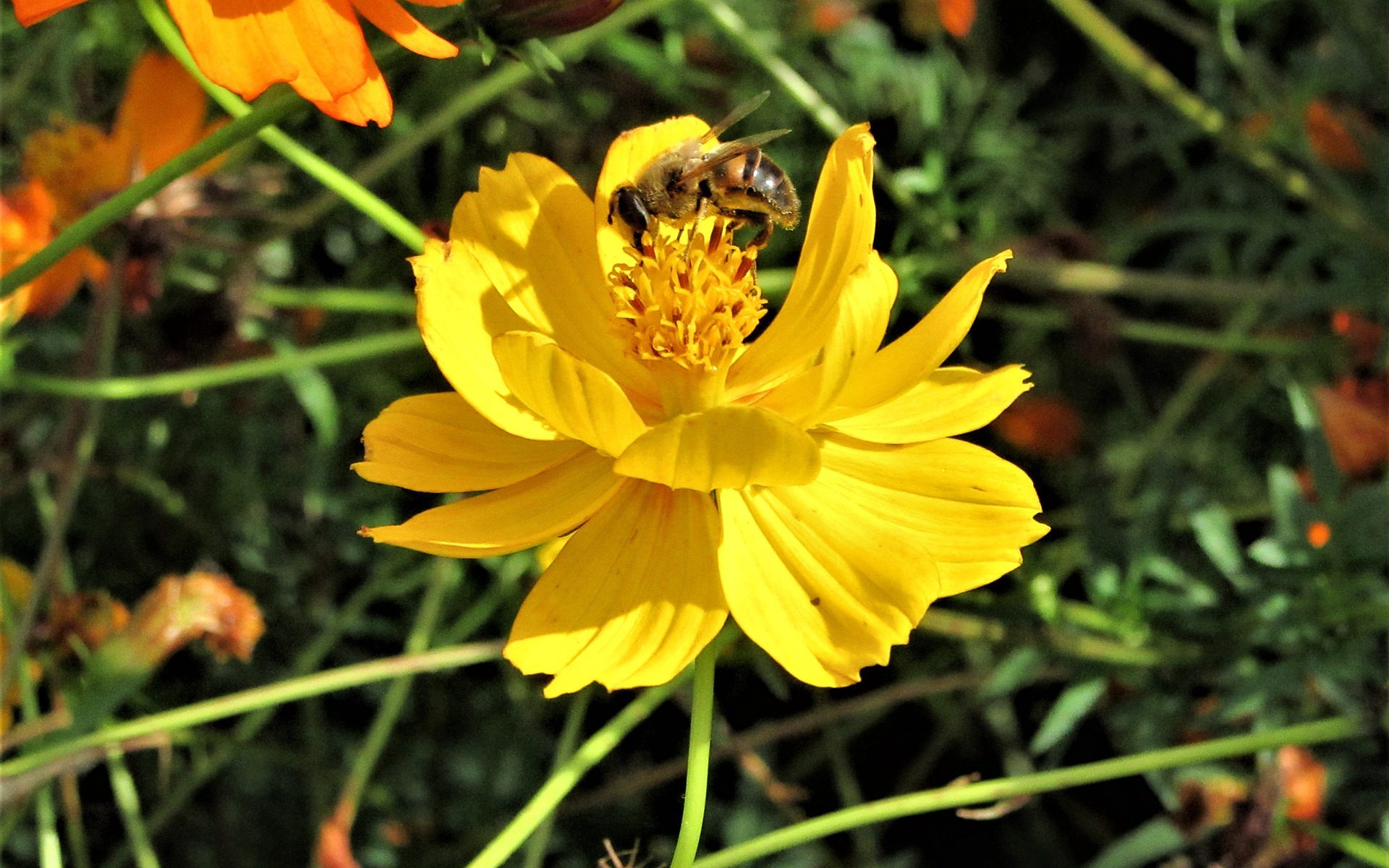
Writing a biology essay may not sound like a very difficult thing to do. In fact, most students really like this subject. The problem is not that you can’t write a good paper on a topic in biology. The problem is with finding excellent biology research topics. Now, you may be wondering why you would want to invest so much time into finding great biology research paper topics. After all, what you write in the essay matters more than the topic, right? Wrong! We are here to tell you that professors really appreciate interesting and unique topics.
And it makes a lot of sense, if you think about it. If you simply pick one of the most popular biology research topics, you will never be able to pique the interest of your teacher. He has read dozens, if not hundreds, or papers on that exact same topic. What you want to do is come up with interesting biology research topics. You want to find topics that none of your classmates are thinking of writing an academic paper about. You will shortly see why this is important. And we will also give you 100 biology topics for research projects that you can use for free – right now!
Biology Research Paper Topics Really Are Important!
It doesn’t matter what area of biology you need to write about. This information applies to everything from zoology and botany to anatomy. The reality is that your professor will really appreciate good topics. And you can rest assured that he or she knows how to spot them. The moment the professor starts to read your paper, he or she will immediately realize that you really did your best to find an excellent topic. And if you write a good introduction paragraph (which contains a captivating thesis statement as well), you are in the best position to earn bonus points.
You may not be aware of it, but teachers are willing to treat great papers with more leniency. This means that you will not get penalized for minor mistakes if you come up with a great topic. In other words, you will get a better grade on your papers if you manage to come up with good research topics for biology. This is a fact and it is based on thousands of pieces of feedback from our readers.
How Do You Choose Good Biology Research Topics?
Choosing research topics for biology can be a daunting task. Frankly, the research paper topics biology students are looking for are not easy to come by. The first thing you want to avoid is going to the first website that pops up in Google and getting your ideas from there. Most of your peers will do the same. Also, avoid topics that are extremely simple. You will simply not have enough ideas to write about. Of course, you should avoid overly complex topics because finding information about them may be extremely difficult.
The best way to find a good topic, in our opinion, is to get in touch with an academic writing company. You will get access to a professional writer who knows exactly what professors are looking for. A writer will quickly give you an amazing research topic in biology.
Eloquent Examples of Popular Biology Research Topics
To make things as simple as possible for you, we’ve put together a list of biology research project ideas. You will find 100 topics on various subjects below. Of course, you can use any of our topics for free. However, keep in mind that even though we are doing our best to maintain this list fresh, other students will find it as well. If you need new topics for your next biology essay, we recommend you to get in touch with us. We monitor our email address, so we can help you right away. Also, you can buy a research paper from our service.
Biology Research Topics for High School
Are you looking for biology research topics for high school? These are relatively simple when compared to college-level topics. Here are a couple of topic ideas that high school students will surely appreciate:
- Identifying Three Dead Branches of Evolution.
- What Is Sleep?
- How Does Physical Exercise Affect the Metabolism?
- A Behavioral Study of Birds.
- How Does Music Affect Your Brain?
- Climate Change and Biodiversity.
- Are Bees Really Becoming Extinct?
- Rainforest Extinction Is Dangerous.
- The Benefits of Organic Farming.
- Can the Brain Repair Itself?
- The Effect of Bacteria on Depression.
- How Do Sea Animals Camouflage?
Research Topics in Biology for Undergraduates
Research topics in biology for undergraduates are more complex than high school or college topics. Our researchers did their best to find topics that are relatively complex. However, each one of the following topics has plenty of information about it online:
- What Is the Mechanism of Metastasis in Cancer Patients?
- How Do Tumor Suppressor Genes Appear?
- How Can We Destroy Cancer Cells Without Damaging Other Cells?
- The Benefits of Gene Therapy.
- Analyzing the Huntington’s Disease (the HTT Gene).
- How Does the down Syndrome (Trisomy of 21st Chromosome) Appear?
- Analyzing the Brain Activity During an Epileptic Seizure.
- How Are Our Memories Formed and Preserved?
- The Effect of Probiotics on Infections.
- Analyzing Primate Language.
- Analyzing Primate Cognitive Functions.
- The Link Between Darwin’s Theory and Biology.
Biology Research Topics for College Students
Biology research topics for college students are of moderate difficulty. They are easier than undergrad topics and more complex than high school topics. While compiling this list, we made sure you have more than enough information online to write the paper quickly:
- Using DNA Technology in the Field of Medical Genetics.
- The Effect of Drinking on Embryonic Development.
- How Are Genes Mapped and Cloned?
- Explain What Genetic Polymorphism Is.
- What Is a Hereditary Disease?
- The Effect of Drugs on Embryonic Development.
- Describing Oligogenic Diseases (like Hirschsprung Disease)
- What Is the Mendelian Inheritance?
- How Transcriptomics and Proteomics Changed Modern Medicine.
- The Risk Factors of Infertility Explained.
- How Does Aging Effect Infertility?
- What Do Ash Elements Do in a Plant?
- Explaining the Pigments in a Plant Cell.
- How Is Photosynthesis Done?
- The Role of Fats in Plant Cells.
- The Effect of Smoking on Embryonic Development.
Cell Biology Research Topics
Some of the best biology topics are cell biology research topics. The scientific community is constantly making progress in this area, so there is always something new to write about. Here are some of the best examples:
- What Is Regenerative Medicine?
- A Closer Look at Tissue Engineering.
- Discuss the Future of Regenerative Medicine.
- Analyzing Therapeutic Cloning.
- The Pros and Cons of Creating Artificial Organs.
- How Do Cell Age?
- Can We Reverse Cell Aging?
- Advances in Cell Therapy.
- What Is Cell Adhesion?
- Explaining Cell Division.
- What Is Cellular Metabolism?
- Describe Active and Passive Transport in Cells.
- What Are Cell Plastids?
Evolutionary Biology Research Paper Topics
If you want something more complex, you can try your hand at writing on evolutionary biology research paper topics. As with all our topics, you will be able to find a lot of ideas and information online. Here are our picks:
- Where Did Plants Come From? (The Evolutionary Theory)
- Explaining the Host-parasite Coevolution.
- How Did Parasites Evolve over Time?
- What Is Natural Selection and How Does It Work?
- Explain Sexual Selection.
- Explain Sexual Conflict.
- How Did Our Immune Systems Evolve?
- How Do New Species Appear in the Wild?
- The Evolution of Cell Respiration.
- What Is the Hippo Pathway? (Developmental Biology)
Various Topics
Antibiotics resistance, agriculture and cloning are hot subjects nowadays. Your professor will surely be interested to learn more about biology research topics. Here is a mix of topic ideas from our established community of academic writers:
- The Problem of Using Antibiotics on Large Scale.
- Examining the Effects of Salt on Plants.
- What Is DNA Technology?
- The Effects of GMOs on the Human Body.
- How Is the Quality of Antibiotics Controlled?
- How Are GMO Food Crops Created?
- The Effect of Veterinary Antibiotics on Humans.
- The Allergic Reactions to Specific Antibiotics.
- A Look at How Penicillin Works in the Human Body.
- How Are Antibiotics Obtained?
- What Are Natural Biochemicals with Pest-repellent Properties?
- The 3 Most Toxic Effects of Antibiotics
- How the Human Body Develops Resistance to Antibiotics.
- The Impact of Biology on the Us Agriculture.
- What Is the Green Revolution?
- Analyzing the Minerals in the Plant Cell.
- Analyzing Muscle Development and Regeneration
- The Uses of Cancer Stem Cells.
Marine Biology Research Topics
There is a lot of talk about global warming, about microplastics in our oceans, and about endangered marine species. This means that marine biology research topics are a very hot topic today. Here are some of our best ideas:
- Can GMO Organisms Break down Oil after Maritime Accidents?
- Pollution-absorbing Bio-films.
- Microbes That Can Absorb Toxic Compounds in the Water.
- Can We Really Use Bioluminescence?
- How Is Bio-diesel Created?
- Analyzing the Coral Reef Biology.
- Why Is the Lobster Population Dwindling?
- The Effect of Mass Fishing on the World’s Oceans.
- Global Warming and Its Effect on Marine Microorganisms.
Molecular Biology Research Topics
Writing about molecular biology research topics is not easy. However, it’s a foolproof way to get a top grade. Your professor will really appreciate your willingness to write an essay about a complex topic. Just make sure you know what you are talking about. Below you can find some of the best topics:
- How Is Insulin Produced?
- How Is the Growth Hormone Produced?
- Analyzing the Repropagation of Translation.
- What Is DNA-telomerase?
- The Process of Sequencing Nucleotides in DNA.
- What Is Telomerase?
- The Link Between Telomerase and Cancer.
- The Link Between Telomerase and Aging.
- How Does DNA Forensics Work?
- Describe the Process of Protein Metabolism.
There is no such thing as easy biology research topics. When the topic is too simple, you end up getting penalized. You can’t write 500 words about it without straying away from the subject. Also, no matter how interesting the topic may be, you should make sure that the essay is written perfectly. This means that not even interesting biology research topics can save you from a bad grade if you fail to follow all applicable academic writing standards.
Find it hard to cope with your college paper? Great news! Use promo “ mypaper20 ” and enjoy 20% discount on a biology writing assignment from our profs!

- Privacy Policy
Buy Me a Coffee

Home » 350+ Biology Research Topics
350+ Biology Research Topics

Biology is a vast field of study that explores the diverse aspects of life, from the smallest organisms to the complex ecosystems they inhabit. With new discoveries being made every day, the field of biology is constantly evolving and expanding. As a result, there are numerous research topics within biology that can capture the imagination of students, researchers , and professionals alike. Whether you’re interested in genetics, ecology, microbiology, or any other subfield of biology, there is no shortage of fascinating topics to explore. In this post, we will discuss some of the most compelling biology research topics that you can delve into.
Biology Research Topics
Biology Research Topics are as follows:
- The role of gut microbiota in human health and disease.
- The effects of climate change on animal behavior and physiology.
- The molecular mechanisms of cancer development and progression.
- The evolutionary origins of human language.
- The impact of pesticides on insect populations and ecosystems.
- The genetic basis of aging and longevity.
- The ecological importance of microbial communities in soil.
- The physiology and behavior of marine mammals.
- The molecular mechanisms of viral infections.
- The evolutionary history of flowering plants.
- The ecological impacts of invasive species.
- The role of epigenetics in gene regulation and disease.
- The evolution of social behavior in animals.
- The physiology and ecology of birdsong.
- The impact of antibiotics on gut microbiota and human health.
- The role of the microbiome in psychiatric disorders.
- The evolutionary history of human migrations.
- The ecological and physiological effects of light pollution on animals.
- The mechanisms of cell division and differentiation.
- The ecological impacts of deforestation.
- The molecular mechanisms of drug addiction.
- The genetic basis of plant resistance to pests and diseases.
- The evolutionary history of human diet and nutrition.
- The molecular mechanisms of neurodegenerative diseases.
- The ecology and evolution of sexual selection.
- The physiological and behavioral effects of air pollution on animals.
- The role of epigenetics in plant development and stress response.
- The evolutionary history of animal domestication.
- The molecular mechanisms of genetic diseases.
- The ecological impacts of climate change on plants.
- The evolutionary history of human mating systems.
- The physiological and behavioral effects of noise pollution on animals.
- The genetic basis of intelligence and cognitive abilities.
- The ecological and physiological effects of ocean acidification on marine organisms.
- The molecular mechanisms of immune system function and dysfunction.
- The evolutionary history of human social structures.
- The ecological impacts of plastic pollution on marine ecosystems.
- The genetic basis of animal migration.
- The physiological and behavioral effects of light and dark cycles on animals.
- The ecological and evolutionary dynamics of symbiosis.
- The molecular mechanisms of gene regulation and expression.
- The evolutionary history of human disease resistance.
- The ecological impacts of overfishing on marine ecosystems.
- The genetic basis of animal communication.
- The physiological and behavioral effects of temperature changes on animals.
- The ecological and evolutionary dynamics of parasitism.
- The molecular mechanisms of circadian rhythms.
- The evolutionary history of human social cognition.
- The ecological impacts of urbanization on wildlife.
- The genetic basis of antibiotic resistance in bacteria.
- The impact of climate change on insect population dynamics.
- The role of the microbiome in the development of autoimmune diseases.
- The genetic basis of complex human diseases such as diabetes and heart disease.
- The evolution of plant secondary metabolites and their ecological functions.
- The effects of anthropogenic noise on animal communication and behavior.
- The molecular mechanisms of protein synthesis and folding.
- The role of RNA in gene expression and regulation.
- The ecology and evolution of microbial symbioses in plants.
- The physiological and behavioral effects of air temperature changes on animals.
- The genetic basis of crop domestication and improvement.
- The evolution of reproductive strategies in animals.
- The impacts of plastic pollution on terrestrial ecosystems.
- The molecular mechanisms of stem cell differentiation and regeneration.
- The ecological dynamics of predator-prey interactions.
- The role of gut microbiota in the regulation of host metabolism.
- The genetic basis of host-pathogen coevolution.
- The evolution of social cognition and cooperation in animals.
- The ecological and physiological effects of wildfires on ecosystems.
- The molecular mechanisms of transcriptional regulation in eukaryotic cells.
- The role of microorganisms in soil nutrient cycling and ecosystem functioning.
- The genetic basis of plant-pathogen interactions.
- The ecology and evolution of microbial communities in the ocean.
- The physiological and behavioral effects of water pollution on aquatic organisms.
- The molecular mechanisms of protein degradation and turnover.
- The impact of urbanization on pollinator populations and plant-pollinator interactions.
- The genetic basis of insecticide resistance in pests.
- The evolution of animal cognition and perception.
- The ecological and evolutionary dynamics of host-parasite interactions.
- The role of epigenetic modifications in plant adaptation to environmental stress.
- The physiological and behavioral effects of endocrine disruptors on animals.
- The molecular mechanisms of DNA replication and repair.
- The impact of ocean warming on coral reef ecosystems.
- The genetic basis of animal personality traits.
- The ecology and evolution of microbial symbioses in animals.
- The physiological and behavioral effects of light quality on plants.
- The molecular mechanisms of RNA editing and splicing.
- The role of microbial communities in plant-pathogen interactions.
- The ecological and evolutionary dynamics of seed dispersal.
- The genetic basis of animal coloration and pattern.
- The impact of climate change on plant phenology and productivity.
- The molecular mechanisms of signal transduction in cells.
- The role of microbial communities in the human gut-brain axis.
- The ecology and evolution of animal migrations.
- The physiological and behavioral effects of chemical pollution on animals.
- The genetic basis of animal development and morphogenesis.
- The evolution of animal social behavior and communication.
- The ecological dynamics of plant-pollinator networks.
- The molecular mechanisms of intracellular trafficking and transport.
- The role of microbial communities in the degradation of pollutants.
- The ecological and evolutionary dynamics of species interactions in ecological communities.
- The role of epigenetics in cancer development and progression.
- The molecular basis of antibiotic resistance in bacteria.
- The impact of climate change on biodiversity and ecosystem functioning.
- The genetic basis of aging and age-related diseases.
- The evolution of social organization in primates.
- The ecological dynamics of plant-fungal interactions.
- The role of microbiota in immune system development and function.
- The molecular mechanisms of DNA damage and repair.
- The physiological and behavioral effects of climate change on marine organisms.
- The genetic basis of human variation and diversity.
- The evolution of sexual selection and mate choice in animals.
- The ecological and evolutionary dynamics of species invasions.
- The role of microbiota in brain function and behavior.
- The molecular mechanisms of immune system activation and regulation.
- The physiological and behavioral effects of pollution on wildlife.
- The genetic basis of behavioral disorders and mental illness.
- The evolution of plant-pollinator mutualisms.
- The ecological dynamics of predator-prey coevolution.
- The role of microbiota in metabolic diseases such as obesity and diabetes.
- The molecular mechanisms of protein-protein interactions and signaling.
- The genetic basis of complex traits such as intelligence and personality.
- The evolution of animal communication and language.
- The ecological and evolutionary dynamics of mutualistic interactions in ecological communities.
- The role of microbiota in the development and maintenance of gut homeostasis.
- The molecular mechanisms of neurotransmitter synthesis and release.
- The physiological and behavioral effects of artificial light at night on wildlife.
- The genetic basis of developmental disorders such as autism and ADHD.
- The evolution of host-parasite coevolution and adaptation.
- The ecological dynamics of plant-herbivore interactions.
- The role of microbiota in the regulation of metabolism and energy balance.
- The molecular mechanisms of membrane transport and signaling.
- The physiological and behavioral effects of habitat fragmentation on wildlife.
- The genetic basis of circadian rhythms and sleep disorders.
- The evolution of animal cognition and decision-making.
- The ecological and evolutionary dynamics of trophic cascades.
- The role of microbiota in the development and function of the respiratory system.
- The molecular mechanisms of epigenetic inheritance.
- The physiological and behavioral effects of endocrine disruptors on wildlife.
- The genetic basis of developmental plasticity and adaptation.
- The evolution of animal social learning and culture.
- The ecological dynamics of predator-prey interactions in aquatic systems.
- The role of microbiota in the regulation of host immunity and inflammation.
- The molecular mechanisms of RNA interference and gene silencing.
- The physiological and behavioral effects of climate change on migratory animals.
- The genetic basis of drug addiction and substance abuse disorders.
- The evolution of animal cooperation and conflict resolution.
- The ecological and evolutionary dynamics of niche construction.
- The role of microbiota in the regulation of host-microbe interactions.
- The molecular mechanisms of gene regulation by non-coding RNAs.
- The role of epigenetics in gene expression and regulation.
- The molecular mechanisms of DNA damage response and repair.
- The impact of environmental toxins on human health.
- The evolutionary origins of viruses and their impact on hosts.
- The genetics of aging and age-related diseases.
- The impact of ocean acidification on marine organisms.
- The molecular basis of cancer development and progression.
- The genetic basis of behavior in animals.
- The impact of environmental stressors on plant growth and productivity.
- The evolution of sex determination and sexual selection.
- The role of the immune system in host-microbe interactions.
- The molecular mechanisms of circadian rhythms and sleep.
- The impact of air pollution on respiratory health.
- The genetic basis of speciation and hybridization.
- The role of neurotransmitters in brain function and behavior.
- The ecological dynamics of microbial communities in soil.
- The impact of climate change on biodiversity and ecosystem services.
- The molecular mechanisms of viral entry, replication, and release.
- The genetics of plant domestication and diversification.
- The role of mitochondrial DNA in aging and disease.
- The impact of deforestation on ecosystem functioning.
- The molecular basis of drug addiction and treatment.
- The genetic basis of adaptation and evolution in response to environmental change.
- The role of gut-brain signaling in behavior and disease.
- The impact of noise pollution on wildlife populations.
- The genetic basis of plant morphology and development.
- The role of the microbiome in disease susceptibility and resistance.
- The ecological dynamics of plant-insect interactions.
- The impact of agricultural practices on soil health and biodiversity.
- The molecular mechanisms of gene regulation in development and disease.
- The genetic basis of complex traits in humans and animals.
- The role of cytokines in immune response and inflammation.
- The ecological dynamics of microbial communities in aquatic ecosystems.
- The impact of plastic waste on marine ecosystems.
- The molecular mechanisms of genome stability and repair.
- The genetics of rare and common genetic diseases.
- The role of the endocannabinoid system in health and disease.
- The ecological dynamics of competition and cooperation in populations.
- The impact of light pollution on wildlife behavior and ecology.
- The genetic basis of animal migration and navigation.
- The role of the microbiome in host metabolism and energy balance.
- The impact of climate change on agricultural productivity and food security.
- The molecular mechanisms of epigenetic inheritance and transmission.
- The genetics of human brain development and disorders.
- The role of pheromones in animal communication and behavior.
- The ecological dynamics of host-microbe-pathogen interactions.
- The effect of diet and nutrition on gut microbiome diversity and composition.
- The ecology and evolution of microbial interactions in the soil.
- The role of epigenetic modifications in cancer development and progression.
- The impact of climate change on marine biodiversity and ecosystem functioning.
- The molecular mechanisms of mitochondrial respiration and ATP synthesis.
- The role of non-coding RNAs in gene regulation and disease.
- The evolution and diversification of flowering plants.
- The effects of artificial light at night on animal behavior and physiology.
- The genetic basis of adaptation to extreme environments.
- The ecology and evolution of plant-microbe interactions.
- The physiological and behavioral effects of noise pollution on wildlife.
- The molecular mechanisms of DNA methylation and histone modification.
- The role of microbial communities in the cycling of nutrients in aquatic ecosystems.
- The evolution of animal color vision and perception.
- The ecological and evolutionary dynamics of mutualistic interactions.
- The impact of deforestation on soil fertility and carbon storage.
- The molecular mechanisms of viral replication and pathogenesis.
- The role of microorganisms in the biodegradation of plastics.
- The ecology and evolution of microbial communities in the human gut.
- The physiological and behavioral effects of climate change on birds.
- The impact of invasive species on native ecosystems.
- The genetic basis of developmental disorders and intellectual disabilities.
- The evolution of animal behavior and communication in response to anthropogenic change.
- The ecological dynamics of soil carbon sequestration and storage.
- The role of microbial communities in the decomposition of organic matter.
- The physiological and behavioral effects of air pollution on plants.
- The molecular mechanisms of cellular differentiation and tissue development.
- The ecology and evolution of plant-animal interactions.
- The genetic basis of resistance to herbicides and pesticides in crops.
- The impact of urbanization on bird diversity and distribution.
- The role of microorganisms in the cycling of carbon and nitrogen in soil.
- The ecological and evolutionary dynamics of invasive species interactions.
- The physiological and behavioral effects of climate change on reptiles and amphibians.
- The role of microbial communities in the degradation of petroleum hydrocarbons.
- The genetic basis of plant development and growth.
- The evolution of animal migration and dispersal.
- The impact of land use change on freshwater biodiversity.
- The molecular mechanisms of membrane transport and ion channels.
- The role of microorganisms in the cycling of sulfur and phosphorus in soil.
- The physiological and behavioral effects of ocean acidification on marine organisms.
- The genetic basis of behavior and personality traits in humans.
- The evolution of plant reproductive strategies and pollination systems.
- The ecological and evolutionary dynamics of predator-prey coevolution.
- The impact of environmental stressors on gene expression and epigenetics.
- The evolution of sexual reproduction and mating systems in plants.
- The role of microorganisms in bioremediation of contaminated sites.
- The physiological and behavioral effects of climate change on fish.
- The molecular mechanisms of chromatin remodeling and gene regulation.
- The genetic basis of adaptation to high altitude environments.
- The ecology and evolution of plant-insect interactions.
- The impact of pesticide use on insect biodiversity and ecosystem functioning.
- The role of microorganisms in nitrogen fixation and cycling.
- The genetic basis of neurodegenerative diseases and cognitive decline.
- The evolution of social behavior and cooperation in animals.
- The ecological and evolutionary dynamics of plant invasions.
- The physiological and behavioral effects of noise pollution on humans.
- The molecular mechanisms of RNA splicing and alternative splicing.
- The role of microorganisms in biogeochemical cycling of trace elements.
- The genetic basis of adaptation to extreme temperatures.
- The ecology and evolution of microbial communities in soil and water.
- The impact of climate change on insect phenology and distribution.
- The molecular mechanisms of protein folding and misfolding.
- The role of microorganisms in biodegradation of environmental pollutants.
- The evolution of animal cognition and intelligence.
- The ecological and evolutionary dynamics of predator-prey interactions.
- The impact of anthropogenic noise on marine mammals.
- The role of microorganisms in biofilm formation and quorum sensing.
- The genetic basis of speciation and hybridization in plants.
- The evolution of parental care and offspring development in animals.
- The ecological and evolutionary dynamics of food web interactions.
- The physiological and behavioral effects of air pollution on human health.
- The molecular mechanisms of transcriptional regulation and gene expression.
- The role of microorganisms in plant growth promotion and disease suppression.
- The genetic basis of adaptation to drought stress in crops.
- The ecology and evolution of microbial interactions in the ocean.
- The impact of land use change on soil erosion and nutrient cycling.
- The molecular mechanisms of autophagy and programmed cell death.
- The role of microorganisms in biodegradation of pharmaceuticals.
- The genetic basis of immune system variation and disease susceptibility.
- The evolution of animal social networks and communication systems.
- The ecological and evolutionary dynamics of biodiversity loss.
- The physiological and behavioral effects of light pollution on nocturnal animals.
- The molecular mechanisms of DNA repair and genome stability.
- The role of microorganisms in the production of biofuels and bioplastics.
- The genetic basis of adaptation to salinity stress in plants.
- The ecology and evolution of microbial symbioses with plants and animals.
- The impact of climate change on plant-pollinator interactions.
- The molecular mechanisms of cellular senescence and aging.
- The role of microorganisms in biodegradation of synthetic organic compounds.
- The genetic basis of variation in complex traits in humans.
- The evolution of animal social behavior and cultural transmission
- The genetic basis of cancer development and progression.
- The role of microorganisms in the gut microbiome and human health.
- The genetic basis of phenotypic plasticity and adaptation in plants.
- The evolution of animal migration and navigation.
- The ecological and evolutionary dynamics of community assembly.
- The physiological and behavioral effects of light and dark cycles on circadian rhythms.
- The molecular mechanisms of protein synthesis and degradation.
- The role of microorganisms in nitrogen and carbon cycling in aquatic ecosystems.
- The genetic basis of sex determination and differentiation in animals.
- The ecology and evolution of predator-prey coevolution.
- The impact of anthropogenic activities on marine biodiversity and ecosystems.
- The role of microorganisms in bioleaching and biomining of metals.
- The genetic basis of inherited disorders and genetic diseases.
- The evolution of animal social behavior and communication systems.
- The ecological and evolutionary dynamics of competition and coexistence.
- The physiological and behavioral effects of endocrine disruptors on human health.
- The molecular mechanisms of cell division and mitosis.
- The role of microorganisms in biodegradation of plastics and synthetic materials.
- The genetic basis of epigenetic inheritance and regulation.
- The ecology and evolution of mutualistic symbioses in plants and animals.
- The impact of habitat fragmentation on species diversity and ecosystem functioning.
- The role of microorganisms in bioremediation of oil spills.
- The genetic basis of drug resistance in pathogens and cancer cells.
- The evolution of animal personality and individual variation.
- The ecological and evolutionary dynamics of biotic interactions in freshwater ecosystems.
- The physiological and behavioral effects of artificial sweeteners on human health.
- The molecular mechanisms of intracellular trafficking and secretion.
- The role of microorganisms in biocontrol of plant pathogens and pests.
- The genetic basis of hybridization and introgression in animals and plants.
- The ecology and evolution of plant-pollinator mutualisms.
- The impact of climate change on marine ecosystems and fisheries.
- The molecular mechanisms of genome editing and gene therapy.
- The role of microorganisms in biogas production and carbon capture.
- The genetic basis of developmental disorders and birth defects.
- The evolution of animal coloration and camouflage.
- The ecological and evolutionary dynamics of invasive species.
- The physiological and behavioral effects of air pollution on wildlife.
- The molecular mechanisms of signal transduction and cell signaling.
- The role of microorganisms in biodegradation of pharmaceuticals and personal care products.
- The genetic basis of reproductive isolation and speciation.
- The ecology and evolution of microbial interactions with plants and insects.
- The impact of climate change on bird migration and breeding patterns.
- The molecular mechanisms of protein-protein interactions and protein complexes.
- The role of microorganisms in bioremediation of heavy metals.
- The evolution of animal cognition and learning.
- The ecological and evolutionary dynamics of biodiversity hotspots.
- The impact of ocean acidification on marine ecosystems.
- The genetics of complex diseases and personalized medicine.
- The evolution of plant defense mechanisms against herbivores.
- The role of microorganisms in soil carbon sequestration.
- The physiological and behavioral effects of light on plant growth and development.
- The molecular mechanisms of cancer metastasis and invasion.
- The ecology and evolution of microbial communities in the human body.
- The impact of climate change on migratory bird populations.
About the author
Muhammad Hassan
Researcher, Academic Writer, Web developer
You may also like

200+ Funny Research Topics

500+ Sports Research Topics

300+ American History Research Paper Topics

500+ Cyber Security Research Topics

500+ Environmental Research Topics

500+ Economics Research Topics
Ask a question from expert
Top 240 Biology Research Topics for Students in 2022

Biology is the scientific study of life and living beings. In this, a student studies physiology, morphology, anatomy, behavior, and other qualities of a living organism. Biology is derived from the Greek words “bios” and “logos”. Bios mean life; logos means study.
Biology is an essential branch of science and the most crucial branch in itself, the medical science emerged parallelly with biology. Today we are aware of the human body parts and the diseases related to them and the cure to the disease, this is all because of biology. Hence, biology is the most helpful branch of science for living beings.
This field of science could be enhanced by the new generation as they perform research for the sake of humanity and for the betterment of medical science so that, in the future, all living beings can live a disease-free life.
Read also: I always find a trusted place to get the best research paper topics .
The Main Branches of Biology and Some General Bio Research Topics
Here, we are going to suggest to you some good research topics in biology which might help you in becoming a good researcher. Thus, will eventually help you in settling one more stair upward towards the betterment of medical science.
Top 20 Innovative Research Topics in Biology
- Genetic engineering.
- Epidemiology in the case of coronavirus.
- Astrobiology.
- Cancerous cells.
- Endangered species recovery.
- Toxins in the human body can kill bacteria.
- Ocean acidification.
- Stem cell research and therapy.
- About pseudomonas aeruginosa.
- Comparative genomics.
- Molecular and genome evolution.
- Neurobiological explanation of sleep.
- Symbiosis in parasites.
- Modern technology and tools in the research of biology.
- Change in the behavior of animals due to climate change.
- Fast food chemicals affect the human body.
- Is a stressful environment and disturbed ecology reason behind the humans taking stress.
- ACHOO syndrome.
- Protein synthesis.
- The mixing of races is an example of cross-breeding.
Top 20 Easy Biology Research Topics
- Male pregnancy in animal species.
- Immune system.
- Metabolism.
- Fertilizers.
- Transportation of essential minerals in plants.
- DNA and physical state.
- Structure of cell.
- Characteristics of DNA and RNA.
- Obesity in youngsters.
- The reason behind giving birth to twins.
- Top killer viruses.
- Birth defects.
- Animal husbandry.
- Pollution in water bodies.
- Protection of endangered species.
- Migratory birds and the reason behind their migration.
- Adaptation of animals towards environments.
- Oils spill into oceans.
- Shale gas reservoirs.
- Acid rain and its effects on living beings and plants.
Do also go through science research topics prior to moving ahead !
What are the Branches of Biology and their Research Topics?
Biology is the study of the vital processes in living beings. Biology is further subdivided into various branches to make it convenient to study. Though, the principle in all the components is the same and consistent. Here are mentioned below, a few sub-branches of biology along with their research topics.
Botany is the study of plants . Botany is the detailed study of the function of plants and types. This is the study of, the classes, family, diseases, etc related to plants. Botany is a good area for research and plant lovers can ace the benefits from the topics that we are going to provide them.
Top 20 Botany Research Topics
- Genetic inheritance in plant species.
- Crop science.
- Plant diseases.
- Plant stress physiology.
- Herbs, shrubs, and trees.
- Innovation in agriculture.
- Plants cross-breeding.
- Cytogenetics.
- Paleobotany.
- Staple crops.
- Multi-cropping.
- Fuel from sugarcane.
- Nitrifying monocot grains.
- High-yield variety of crops.
- Plant lectins in cancer therapeutics.
- Synergy among anti-bacterial peptides.
- Land plant molecular phylogenetics.
- Describe the role of anti-microbial peptides in the community of plants.
- What are vascular plant apomorphies?
You might also be interested in knowing Different Branches of Chemistry
Zoology
Zoology is the branch of biology that deals with the study and research of animals and the animal kingdom, and how they interact with their ecosystem. The student of zoology comprehensively studies the structure, embryology, evolution, classification, habits, and distribution of all animals, both living and extinct.
Research in this branch of biology is a daunting task, it requires lots of observation and patience, as it is difficult to understand the behavior of an animal. Here we are to suggest to you some good zoology research topics having a good scope of research.
Top 20 Zoology Research Topics
- Phylogeny of invertebrates.
- Explain Animal kingdoms and classes both horizontally and vertically.
- The origin and evolution of the multicellular organism.
- Warm-blooded and cold-blooded animals.
- Vertebrates and invertebrates.
- Explain the Development cycle of non-helminths-geohelminths and non-helminths-biohelminths.
- Discuss the Arthropods' existence and evolution.
- Crustaceans and their variety.
- How did the primate evolve?
- Diversity of flatworms and tapeworms.
- Types of flagellates.
- Features of cephalopods.
- State the difference between Polyplacophora and Monoplacophora.
- Characteristics of annelids.
- What is anthropogenesis?
- Describe the anatomical view of invertebrates and vertebrates.
- What is the difference between an open and closed circulatory system?
- The mammals' class system and division.
- Reptiles and their evolution.
- Extinct animals and the reason behind their extinctions and a way forward to this.
Genetics is the scientific study of genes and heredity . Researchers notice, how certain qualities or traits are passed from parents to offspring due to changes in the DNA sequence.
A gene is the basic segment of DNA that contains instructions for building one or more molecules that help the body work. The structure, function, variation, and distribution of genes are studied within the context of the cell, the organism, and within the context of the population.
Also Read: Twin Research and Human Genetics
Writing a research paper on this branch of biology is going to be an exciting task. Here we have a few interesting topics related to genetics:
Top 20 Genetics Research Topics
- Chromatin structure.
- Gene editing.
- Gene therapy.
- Microbiome.
- Neuroscience.
- Epidemiology.
- Population genetics.
- Prenatal screening.
- Genetic abnormalities.
- Mitochondrial disorders.
- Pronuclear transfer.
- Maternal spindle transfer.
- CRISPR-CAS9 gene editing.
- Inherited diseases.
- Parkinson’s disease.
- Turner syndrome.
- Klinefelter syndrome.
- Down syndrome.
- Fragile X syndrome .
Environmental Biology
Environmental biology lies in resemblance to ecology, it is a scientific program that focuses on the scientific study of the origins, relationships, functions, interactions, and the natural history of all the living beings, populations, species, and communities, in an ecosystem.
Environmental biology is the most crucial branch of biology and an essential topic for research. Due to climate changes and the extinction of some species, This field of biology requires good and comprehensive research so that a step toward the betterment of an environment can be found and taken by humanity. Here we are going to suggest to you some good environmental biology topics.
Top 20 Environmental Biology Research Topics
- Chemical ecology.
- Tropical wetland ecology.
- Animal behavior.
- Migration of some species due to environmental changes.
- Renewable energy.
- Fire ecology.
- Bioremediation.
- Environmental justice.
- Carbon emissions and control.
- Endemic wildlife.
- Importance of national parks.
- The important role played by wildlife sanctuaries.
- Saving our planet by using green energy.
- Melting of permafrost.
- Depletion of the ozone layer.
- Lungs and heart diseases are increasing due to climate change.
- Destruction of the forest ecosystem is a matter of concern.
- Urban migration.
- Contamination of groundwater.
Need help with Environmental Science Homework Help ?
Cell Biology
Cell is the basic unit of life, multiple cells are combined together to form a tissue and multiple tissues are further combined to form an organism. Cell biology is the branch of biology that studies the structure, function, and behavior of cells in different living beings.
Cell biology encompasses the study of both eukaryotic and prokaryotic cells and both multicellular and single-cell organisms. As every living being is made up of cells, this branch of science becomes the most important branch of biology and the field of research.
Top 20 Cell Biology Research opics
- Cytoskeleton.
- Cell motility.
- Chromatin and gene expression.
- Endosymbiosis.
- Cell evolution.
- Cellular metabolism.
- Cell fate determination.
- Development of the embryo.
- Organelle biogenesis.
- Schistosomiasis.
- Cell differentiation and morphogenesis.
- Stem cell biology.
- Host-parasite interaction.
- Lymphocyte migration.
- Temporal and spatial control of gene expression.
- Epigenetics.
- Cell signaling.
- Regeneration of cells.
- Cell division
Biotechnology
Biotechnology is an integrated study of engineering sciences and natural sciences . It is done with the aim to achieve the applications of cells, organisms, and parts for products and services. It is referred to as using a living organism to produce a different product.
For instance, yeast is a living organism used in the baking of bread. This branch of biology also has a wide scope of research, as our food habits are proportionate to food packaging. Hence research in this field becomes mandatory and going to be proved useful. We are going to suggest to you some good research topics in biotechnology .
Top 20 Biotechnology Research Topics
- Cancer biotechnology.
- Transplantation biology.
- Cell and molecular biology.
- Microbial biotechnology.
- Environmental biotechnology.
- Nanobiotechnology.
- Sustainable and global health biotechnology.
- Pharmacogenomics of anti-hypertensive drugs.
- Pharmacogenomics of metformin in diabetes mellitus type2.
- Medical biotechnology.
- Proteomics.
- Structural biology of infectious diseases.
- Pharmaceutical biotechnology.
- Agricultural biotechnology.
- Bioengineering and research.
- Y-chromosome genotyping.
- Role of Embelin in cancer.
- Hypoallergenic fermented foods.
- Exocellulase and Endocellulase.
- Techniques of protein purification.
Molecular Biology
Microbiology is the branch of biology that seeks to understand the function and structure of the macromolecules that are essential for life. The detailed study of the physical and chemical structure of biological macromolecules is called molecular biology . It is essential to understand the chemical function happening in a living being as they affect both the physical and mental health of an organism.
Writing a research paper is also a crucial task as research in this field is a need of an hour because chemical and hormonal changes take place in a body time and to balance these chemical ups and downs in a body a good medicine or a technique is required which can be invented by good research. So your research paper in molecular biology should entail a series of your findings. Here we are to recommend you few topics to research and write about.

Top 20 Molecular Biology Research Topics
- Structure of DNA.
- Structure of RNA.
- Polymerase chain reaction.
- Recombinant DNA technology.
- Transcription of genes.
- Cell division.
- DNA cloning.
- Prokaryotic transcription.
- Eukaryotic transcription.
- Gene regulations.
- Protein synthesis in cells.
- Chromosome building and function during mitosis.
- Cystic fibrosis.
- Alkaline phosphatase.
- Plasmid loss in bacteria.
- Chemo-enzymatic synthesis.
- Monoclonal antibodies.
- Non-histone proteins.
- Telomerase insufficiency.
Need help with Biology Homework Help ?
Neurobiology
Neuroscience is the branch of biology that deals with the scientific study and functions of the nervous system. The nervous system is made up of three parts: the brain, the spinal cord, and the peripheral nervous system. Neurobiology or neuroscience has a broader scope of research in which a scientist uses different approaches to study the nervous system at different scales. Here we are to suggest to you some really good research topics on neurobiology .
Top 20 Neurobiology Research Topics
- Cellular and molecular neuroscience.
- System neuroscience.
- Cognitive and behavioral neuroscience.
- Computational neuroscience.
- Clinical neuroscience.
- Degenerative brain disorder.
- Dopamine in the brain. What is its role?
- Functional organization of memory.
- Neuroplasticity.
- Schizophrenia.
- Enhancing memory through electrical stimulation.
- Transcranial magnetic stimulation.
- Postpartum depression.
- Algorithms in the brain.
- Effects of LSD.
- Analyze the prefrontal cortex.
- Role of the cerebellum.
- Neurotransmitter disabilities.
- Role of axon in handling the action potential.
- Hippocampus area of the brain.
Top 20 Biology Research Topics for High School Students
- What are cloning and its basic principles?
- Genetic disorders.
- Coronaviridae.
- The human brain and nervous system.
- The right and left sides of the brain. differentiate them on the basis of functions.
- Hormonal changes.
- Immunity system.
- Open and closed circulatory system.
- Viviparous organisms.
- Oviparous organisms.
- Oxytocin and serotonin.
- Human reproduction.
- DNA and physical traits are transferred to offspring.
- Climate change.
- Gases are involved in global warming.
- Tissues in plants.
- Differentiate between plant tissue and animal tissue.
- Role of stomata in the process of photosynthesis.
- Structure of cell and difference between animal and plant cell.
You might also be interested in choosing: Research Topics for High School Students
Top 20 Biology Research Topics for College Students
- Characteristics of viruses.
- Single cellular organisms.
- Research methods in cell biology.
- Visual cortex.
- Depression in youngsters.
- Heartattack these days.
- Oxidative stress.
- Cardio exercises.
- Hormonal changes in the female body.
- Anatomy of a fish.
- Anatomy of a cockroach.
- Anatomy of annelids.
- Anatomy of a frog.
- Biological names.
- Morphology of flowers(rose).
- Darwin’s theory.
- Natural selection theory.
- Survival of the fittest theory.
Conclusion:
Biology is a vast field having many branches and sub-branches . Through this blog, we have discussed with you a few topics of biology for both college and high school students, some innovative and easy topics of biology to research, and comprehensively elaborated on every branch of biology along with its research topics. Our suggestions and discussion will bring you the confidence to write a good biology research paper.
Some more interesting research topics for other different subjects:
Top Trending 150+ Accounting Research Topics
130+ Marketing Research Topics for Marketing Students
Top 140+ Research Topics for Journalism Students
100+ Research Topics for Physiotherapy Students in 2022
120 Hot Research Topics for Nursing Students
Top 50+ Research Topics for High School Students in 2022

Business Management
Writing & Compare Documents
Computer Science
Teaching and Learning
Personal Development
Research Topics
Recruitment
NVQ Level 3 Diploma in health & social care
Digital Marketing
Assignment Writing
International
Speech Topics
Travel And Lifestyle
Project Proposals
Your Feedback matters

Introducing PolyPilot:
Our AI-Powered Mentorship Program
Biology Research Projects for High School Students: 20 Ideas To Try This Summer

By János Perczel
Co-founder of Polygence, PhD from MIT
16 minute read
Biology and biomedical research are two of the most popular academic disciplines among high schoolers. If you’re someone who’s interested in those fields and you’re looking for research opportunities this summer, you’ve come to the right place! With the study of biology, not only can you gain a better understanding of the natural world, but your research can have practical applications in fields like medicine, agriculture, and environmental science. Whether you’re just starting out in your exploration of biology, have taken a biology class in school, or you’re looking to do some advanced research to submit to your state’s science fair, we have level-appropriate ideas for you!
With a variety of topics like cancer treatment, genetics, neurodegenerative diseases, and marine life, we’ve got you covered. Here is a curated list of 20 different research project ideas to get those creative juices flowing. If you’re hungry for more, head over to our comprehensive Project Ideas database here and browse over 2800 more ideas!
Research YOUR fave areas of Biology and Medicine
Polygence pairs you with an expert mentor in to create a passion project around biology and medicine. Together, you work to create a high quality research project that is uniquely your own. We also offer options to explore multiple topics, or to showcase your final product!
Human Body Project Ideas
Rate of cognitive decline in different elevations.
Oxygen partial pressure decreases with altitude, challenging blood oxygenation which may affect brain function. If you’ve ever felt some altitude sickness, then this is exactly what’s happening. This is because the atmospheric pressure decreases at higher elevations, leading to a decrease in the partial pressures of the gasses in the air, including oxygen. And of course, oxygen is needed for us to function. What is the effect on brain health/ cognition in sudden increased elevation: say, climbing Mount Everest? Does chronic exposure to high elevations increase the likelihood of dementia? In this project, a meta-analysis of published works examining the effects of altitude on cognition would be conducted.
Idea by mentor Alyssa
Building a Blood Vessel
Use online graphics to illustrate how a blood vessel forms. Blood vessels are structures that carry blood and are responsible for transporting nutrients and oxygen throughout the body. There are three main types of blood vessels: arteries, veins, and capillaries. For this project, complete a literature search to understand what is known about blood vessel growth. Then, utilize this information to generate a graphic with no words to demonstrate how the vasculature (network of blood vessels) forms. The goal of this project is to explain science without using text and therefore make it more available to a larger community.
Idea by mentor Natalie
Examining the bacterial profile of various households
As of late, bacterial microbiomes have been a huge and interesting topic in the field of bacteriology as they play an important role in human health. Bacterial microbiomes are communities of bacteria that live on or outside organisms. They’re found in various parts of the human body, and help us to digest food and regulate our immune system. In this project, you will seek to understand how skin microbiomes can differ between different individuals of different households. This project will require making different bacterial media that can be made at home selecting for various microorganisms. If you’re new to preparing bacterial media, check out this resource here!
Idea by mentor Hamilton
Regulation of Circadian Clocks
Sleep is known to be governed by two distinct processes: a circadian clock that aligns sleep and wakefulness to the solar day and the sleep homeostat that encodes for sleep debt as a compensatory mechanism against sleep loss. You’ve most likely heard about circadian rhythm and our body’s internal clock, and circadian regulation of sleep is a fundamental process that allows animals to anticipate sleepiness or wakefulness consistently every day. These mechanisms can be regulated in multiple ways: at the gene, protein, gene, and clock neuronal level. In this project, we will focus on 1) how to efficiently digest primary and review articles to compile and condense information, 2) investigate how circadian clocks are regulated at these different genetic levels, and 3) try to effectively summarize the information we've gathered. We can present this information in a variety of ways, and what the final product looks like is up to you.
Idea by mentor Oscar
The Biology of Aging
Aging is the number one risk factor for a variety of diseases including cancer, neurodegenerative disease, and loss of hearing/sight. We are only now beginning to truly understand the process of aging and have even started to uncover ways that we could stop, or potentially reverse, the effects of aging. What are the hallmarks/signs of aging? How do researchers study 'aging'? How does human lifespan and aging compare to the rest of the animal kingdom? Is it possible to stop or reverse the effects of aging? What advancements are being made related to this? We could explore these questions or brainstorm others you might have about the biology of aging.
Idea by mentor Emily
Animals, Plants, and Nature Project Ideas
How genetically engineered mosquitoes are reducing rates of vector-borne diseases such as zika.
Many countries are already releasing millions of genetically engineered mosquitoes into the wild every week. These mosquitoes have been modified to reduce their ability to transmit disease-causing pathogens like dengue fever, Zika, and malaria, and are sent into the wild to mate with disease-carrying mosquitoes. However, this is still controversial as some people are concerned about the unintended consequences on the environment. What could be the potential pros and cons for this? The project will mainly focus on doing meta analysis of articles and watching informative videos to understand how/why genetically engineered mosquitoes can be used to reduce rates of different diseases. Students will have the chance to use critical thinking and do in-depth research on genetic engineering techniques, how scientists determine breeding rates and number of insects released, and epidemiology of different bloodborne diseases.
Idea by mentor Vanessa
Efficacy of Marine Protected Areas
Marine protected areas (MPAs) are areas of ocean or coastal waters that are set aside for the conservation and sustainable use of marine resources. These areas are established by governments, NGOs, or other organizations, and they can take different forms, from fully protected "no-take" zones to areas with regulated fishing or other activities. Marine protected areas have the potential to guide sustainable resource management and protect biodiversity, but have a host of reasons for why they are not currently effective. Explore reasons for why MPAs may not be effective. Then develop a framework for mapping, modeling, and implementing an effective Marine Protected Area.
Bioinspiration: Do animals hold the answers?
Can the toxins produced by frogs help us fight antibiotic resistant bacteria strains? How can understanding how lizards and newts regrow their limbs help us improve wound treatment? Why do tilapia skins help with burns? Discover the role of animals in the development of modern medicine as well as its potential. Are there any ethical concerns with these developments and findings? If so, what are they and do they matter? Share your findings in a research proposal, article, or presentation.
Idea by mentor Cheyenne
How Climate Change Can Affect Future Distributions of Rare Species
Climate change, such as global warming and longer drought, can threaten the existence of some of the rarest plants on earth. It is important to understand how future suitable habitats will change for these rare species so that we can target our conservation efforts in specific areas. In this project, you will identify a rare species that you like (it can be animals, plants, or fungi!), and gather the data online on its current occurrences. Then you will learn how to perform species distribution modeling to map its current and future suitable habitat areas. To get you started on learning species distribution modeling, check out this Youtube resource here. The changes in the amount or location of future suitable habitats can significantly affect the destiny of a rare species. By doing this project, you will not only learn skills in data analyses but also become the best ambassador for this rare species that you love.
Idea by mentor Yingtong
A Reef’s Best Frenemies
Coral reefs are in global decline. A primary cause of this is "coral bleaching" which results in the white reefs we often see in the news. Coral bleaching is actually the breakdown in the partnership between the coral animal and tiny, symbiotic algae that live within its cells. Corals and algae have a variety of thermal tolerances which are likely decided by genetic and environmental factors. However, despite how important this relationship is, it's currently very poorly understood. This project would review existing literature on the symbiotic partnernship and try to identify factors that predict bleaching and thermal resilience.
Idea by mentor Carly
Dive in to BioMed NOW!
Register to get paired with one of our expert mentors and to get started on exploring your passions today! You have agency in setting up your schedule for this research. Dive in now!
Diseases and Treatments Project Ideas
The understanding of a new and upcoming treatment: immunotherapy.
Immunotherapies have been growing in the past few years as alternative treatments for many types of cancer. These treatments work by boosting the patient's immune system to fight the disease, however it is not always effective. There are many types of immunotherapies with various nuances, but they all work to attack specific cells that are causing the disease. For this project, pick one of a few types of immunotherapy and deeply understand the mechanism of action and what is the current effectiveness against the cancer it treats.
Idea by mentor Hannah
Exploring The Cancer Genome Atlas data
There has been an explosion of publicly available data for cancer. The Cancer Genome Atlas was a research program with the purpose of creating a comprehensive catalog of genomic and molecular information about different types of cancer, with the aim of improving our understanding of the disease and developing new treatments. The dataset has been used to identify new cancer subtypes, develop diagnostic tests, and discover potential targets for new cancer therapies. Explore the implications and impact of The Cancer Genome Atlas data, and why it’s become so important.
Idea by mentor Hersh
Systematic Review and Meta-Analysis of Physiological Benefits of Fasting-induced Autophagy
Autophagy, meaning "self-eating", is a cellular process where damaged or unwanted components are disposed. Autophagy has been linked to various diseased pathologies, including cancer and heart disease. Fasting or specific dietary lifestyles may induce levels of autophagy in the human body. In this project, we will perform and systematic review and meta-analysis of fasting or diet-induced autophagy and its benefits on the body. You will gain skills in 1) searching and reviewing primary literature, 2) computational skills for performing data analysis (R language), and 3) writing your scientific findings.
Idea by mentor Jose
The Amyloid Hypothesis: Sifting through the controversy
For many years, scientists have thought that amyloid beta was the protein responsible for a patient developing Alzheimer's Disease symptoms. This "Amyloid Hypothesis" is now being questioned in light of current clinical data. Recently, drugs have been developed that reduce amyloid beta in patients. Surprisingly, the drugs worked in reducing amyloid beta, but it did not result in the slowing of disease pathology. Does this mean that the amyloid hypothesis is incorrect? Is amyloid beta less important in the progression of disease then what we once thought? This research project aims to explore the issues with the amyloid hypothesis and to assess where we stand in our understanding of amyloid beta's contribution to Alzheimer’s.
Idea by mentor Patrick
How do vaccines work?
During the COVID pandemic, vaccines have been all over the news! But how do they actually work? What’s the science behind them? Through this project, you will explore how vaccines work and the history of science behind vaccine development. While the final product of the projectwill be up to you, the ultimate goal of this project is for you to be a true public health advocate for vaccines and to be able to communicate why vaccines are so important in a way that the general public can understand.
Idea by mentor Helen
Sleep Disruption Profiles in Various Mouse Models of Alzheimer’s
Alzheimer's disease (AD) has been studied for decades but we are no closer to understanding the mechanisms of the disease. Because of the vast number of researchers studying AD, there are numerous models used to study the disease. All these models have different sleep profiles, phenotypes, disease onsets, sex differences etc. Therefore, in this project we will compile a document based on extensive literature review about the various models there are. We will focus on sleep profiles in these animals with an emphasis on male and female differences. This information is valuable because it is important to know which model is best to use to answer your scientific questions and there is a lot of criticism (by other scientists) that can be brought on by the model chosen so you need to be able to justify your choice. This project will also introduce you to the world of AD research and some of the gaps in knowledge in the field.
Idea by mentor Shenee
Rethinking The Treatment Of Neurodegenerative Diseases
Neurodegenerative diseases affect millions of people worldwide. They are conditions that affect the nervous system, particularly the brain and spinal cord, and examples include Alzheimer’s and Parkinson’s. While billions of dollars have been spent trying to find treatments for the disease, very few drugs and therapies have had a meaningful impact on slowing down disease progression. This is often because by the time someone is diagnosed with a disease, it has progressed too far for a treatment to have a substantial effect. Some recent approaches to treatment have turned to looking for early indications of the disease (termed "biomarkers") that can occur before the onset of symptoms. By diagnosing disease and beginning treatment before symptoms arise, these treatments could have a more profound effect in slowing down the progression of disease. Students could review the recent progress being made on identifying biomarkers for neurodegenerative diseases, and either write a paper or even record a podcast on their findings!
Idea by mentor David
Genetics Project Ideas
Height and genetics: nature or nurture.
How much do your genes determine your height? How much do nutrition and environmental factors play a role? What gene variants are implicated in height differences and what is the role of epigenetics? Epigenetics is the study of heritable changes in gene expression or cellular phenotype that occur without changes to the underlying DNA sequence. These changes can be influenced by diet and lifestyle. We will access and analyze an open dataset on twins to estimate the correlation between monozygotic twins (who have the exact same DNA) and height. You will learn to use R to open a dataset, analyze data with statistical methods such the student’s t-test, and display your data as graphs and charts. Finally, you will learn how to make a research presentation on height and genetics, describe the research methods, and present the data in a compelling and thorough way.
Idea by mentor Adeoluwa
The World of Personalized Medicine
Similar to our fingerprints, our genetic code is also unique to each individual person. Our genetic code is what determines our hair color, height, eye color, skin tone...just about everything! For those that develop diseases such as cancer, their genetic code found inside the malignant cells that comprise a tumor may also be unique to them or to certain groups of people with similar mutations (the drivers of disease). So why is it that we treat each person the same way even though the genetic drivers of that disease may be disparate? The world of Personalized Medicine is new and exciting and looks to circumvent this problem. Personalized Medicine (also known as precision medicine) uses the genetic code of a patients disease to guide treatment options that prove to be highly efficacious. Together, lets write a review on a disease of your choice that could benefit from Personalized Medicine based on current literature and research.
Idea by mentor Somer
General Biology Project Ideas
Teach a biology concept two ways: to your fellow students and to the general public.
One of the best ways to learn is to teach. Choose a biological concept that interests you and prepare a lesson and or demo on it. The format should be a video recording of yourself teaching (a la Khan Academy or a Zoom class), but the other details are up to you. Consider incorporating a demonstration (e.g. how can you use items from your kitchen to illustrate properties of mixtures?) or animation (e.g. to illustrate molecular motion). Also consider how you will check that your students understand the concept(s) and/or skill(s) you have taught them. Prepare and record two versions of your lesson: one intended for your peers and one for the general public. How will the versions differ to reflect these different audiences? You will learn what it's like to teach, gain a much greater understanding of your chosen concept(s)/skill(s), and learn how to communicate science to different audiences.
Idea by mentor Alexa
Once you’ve picked a project idea, check out some of our resources to help you progress with your project! Whether you’re stuck on how to cite sources , how to come up with a great thesis statement , or how to showcase your work once it’s finished , we’ve created blog posts to help you out. If you’re interested in doing one of the biology research projects with the help of an amazing mentor at Polygence, apply now ! If you would like some help with coming up with your own idea, book a complimentary consultation call with our admissions team here !
Feeling Inspired?
Interested in doing an exciting research project? Click below to get matched with one of our expert mentors!
200 Distinctive Biology Research Topics to Write a Killer Paper

Biology research topics are crucial for students as they deepen their understanding of the natural world and its intricate processes.
Engaging with these topics fosters critical thinking, analytical skills, and scientific literacy.
In today’s post our writers have compiled a list of biology research paper topics that will help students gain access to valuable insights, up-to-date information, assisting their excellence in their academic pursuits.
This content serves as a reliable source for students to explore diverse topics and stay informed on the latest developments in the field of biology.
After reading this exciting blog post, you’ll know what to expect from a good paper writing service . So, without further ado, let’s get started.
Table of Contents
Unique Biology Research Topics for You to Score High
Writing a research paper on biology topics can be exciting if you know how to pick the right subject.
Stay up to date with what established biologists are studying and ensure your topic is something you can easily research and back up your ideas with.
Here’s a list of some of the most remarkable topics for an excellent college paper.
Top Biology Research Topics
- Can drug addiction be regarded as a disease?
- Discussing Ebola as a biological weapon.
- How does human memory work?
- Can we consider immortality a reality?
- Plant diseases and their causes.
- Analyzing if dormant microbes trigger Alzheimer’s ?
- The significance of molecular biology in cancer treatment.
- The difference between bisexuality and homosexuality in animal species.
- How are obesity and genetics connected?
- Understanding stem cell research.
- How are hormones influencing the human body?
- The most beneficial biological development in history.
- Basic principles of human cloning.
- Maintaining the ecosystem and its importance.
- How are organisms adapting to challenging situations?
- Understanding the hierarchical structure of single-celled organisms?
- The primary function of multicellular organisms.
- Discuss how a fossil supports the theory of evolution.
- Understanding different cell reproduction types.
- Reasons why enzymes are essential.
- Difference between eukaryotes and prokaryotes.
- The process of photosynthesis.
- How does human metabolism work?
- The difference between mitosis and meiosis.
- Probability of gene inheritance.
- Understanding the DNA Structure.
- How is PCR used?
- The mechanism of cloning.
- Discussing the carbon cycle mechanisms.
- Effects of humans on biodiversity.
- Main factors regulating the dynamics of a population.
- The modern relatives of dinosaurs.
- Strategies organisms use for acquiring nutrition.
- The tree of life.
- Understanding the concept of natural selection.
As time progresses, biologists are increasingly exploring animal research topics in addition to human studies. These subjects encompass investigations into animal evolution, existence, and survival.
By delving into these areas, researchers comprehensively understand the intricate relationships between various species and their environments, ultimately enhancing our knowledge of the natural world.
Unique Biology Research Topics
Every day, the world of science uncovers new discoveries, with dedicated researchers continuously embarking on medical expeditions.
These efforts have led to the identification of numerous autism research topics , significantly enhancing our understanding of this complex condition.
As a result, these findings have greatly benefited the field of special education research , paving the way for improved support and tailored interventions for individuals with autism.
By staying informed on the latest advancements, we can collectively contribute to a more inclusive and empathetic society.
If you want your paper to stand out, pick one of these great research topics for your biological research!
- The role of cells in healing damaged bones.
- The right amount of protein to consume.
- Effects of cancer on growth cells.
- Is it ethically good to research stem cells?
- Different ways in which cells communicate.
- How are DNA and the environment connected?
- Recent developments in cell biochemistry.
- Can you reverse the process of aging?
- How are cilia facilitating the cells’ movement?
- Reasons why cells get sticky.
- Understanding how the brain keeps memories.
- Is surgery the only way of treating glaucoma?
- Understanding protein biosynthesis process.
- The central dogma of molecular biology – what must you know?
- Understanding diffusion as a transport technique.
- The role of microtubules in the nervous system.
- Ways to improve hypertrophy in the body.
- The impact of sunburns.
- The effects of music on the brain.
- How is learning affected by the sleep and wake cycles?
- Is drinking more water could prevent extensive sunburns?
- The effects of sunlight on biomass.
Easy Biology Research Paper Topics
If you are new to the field of biology, then you can start looking at this list of easy biology research topics.
- The process of tissue formation.
- Reasons for the existence of different congenital disabilities.
- Existing HIV drugs and their complexities.
- Why does chemotherapy fail for some patients?
- The effect of germs on the cells.
- How does the sun affect the skin?
- Why can’t we treat some diseases with drugs?
- Ways to treat animals that are carrying the virus.
- Discuss the five animals in extinction.
- Why should people care for endangered species?
- Can humans sustain a plant-based diet?
- The inconveniences of space travel.
- The emergence of leukemia.
- Understanding the human immune system.
- Factors responsible for weakening the immunological system.
- The origin and consequences of autoimmune.
- How immune disorder affects the human body.
- Effectiveness of vaccines in eradicating a disease.
- Complexities of taking the Hepatitis B vaccine.
- Why do humans have allergies?
- How does DNA modification work?
- Common misconceptions about COVID-19.
Interesting biology research topics
Looking into biology can be super fun – many cool topics exist. High school and college students can find something that interests them, whether a common topic relevant to the community or something more fascinating. It’s worth checking out!
- Effects of marijuana and alcohol on teenagers.
- How is alcohol affecting teenagers and adults?
- How is neuroscience helpful in coping with emotional pain?
- How does the brain process speech?
- Factors that are responsible for autism.
- Is it true that a human is an animal?
- The effect of isolation on the human brain.
- Factors contributing to automatic responses.
- How is noise pollution affecting living organisms?
- Understanding the fire ecology.
- Understanding the term bioremediation.
- What should we know about urban ecology?
- Is excessive internet usage damaging to human memory?
- Understanding the infectious-disease-causing agents.
- The importance of cancer research.
- Why is genetic engineering a challenge?
- The role of melatonin in therapy.
- Are hormones responsible for risky behavior?
- What is the latest research on stem and cloning?
- Physical activities and their role in hormone development.
- Transgenic crops – benefits and threats.
- Analyzing the fight against smallpox.
- The future of prosthetic appliances.
- Examining mind-controlled limbs.
- Is cosmetic surgery a need?
- The significance and process of vascular surgery.
- Analyzing trends in biomedicine.
- The functions of X-rays.
- The most effective way of preserving wildlife.
- Poverty and its contribution to climate hazards.
- Analyzing how a human body reacts to poison.
- The misconceptions about sexually transmitted diseases.
- The significance of understanding evolutionary biology.
Good biology research topics
If you’re looking for an exciting biology research paper topic, try and find one that offers an unexpected angle on life.
It should be engaging, captivating, and relevant to the world. It’s all about exploring a subject with lots of potential and can help us better grasp life and living organisms.
Here’s another list of great topics for your biology research.
- Understanding quantitative ecology.
- The causes of acidification of seas and its consequences.
- Immortality of jellyfish.
- The difference between seawater and freshwater.
- The evolution of the deep sea.
- The communication techniques of whales.
- Coral reefs and their importance to seawater.
- The effects of tourism on natural animal habitats.
- Is it possible to domesticate wild marine animals?
- The pros and cons of living in the coastal zone.
- The survival of plants in the sea.
- Analyzing two different species of animals in the water.
- Ways to generate and use marine energy.
- Molecular genetics and its ethical considerations.
- Understanding the structure of the gene.
- Analyzing restrictions in the DNA.
- Examining the building blocks of life.
- Understanding why prion disease is so dangerous.
- Dominant genes vs. recessive genes.
- Is there a possibility of human DNA getting damaged?
- What is the objective of nucleic acid?
- How to cope with the challenge of animal extinction
- Things we should know about sea life.
- The history of genetics.
- How has the lockdown affected social interaction?
- Reasons behind some people refusing the vaccine.
- Is animal hunting a fashion or a need?
- The evolution of a virus.
- What does invasive species mean?
- Is life on Mars Possible?
- Understanding the term’ herd immunity.’
- How are biology and archaeology related?
- What should we know about natural selection?
- The dead branches of evolution.
- The present trends of whale hunting.
Biology research topics related to cells and more
Advances in cell biology can help treat illnesses and wipe out viruses. Crafting a paper on this topic can be a satisfying experience for any biology student. Here you go with some interesting topics related to cells and more.
- The effects of gut bacteria on the brain.
- Ethical concerns around organ transplant.
- How does alcohol affect the liver?
- Is obesity related to genetics?
- Why do we need genetically modified foods?
- Sun exposure and its effect on the human skin.
- Is it correct to say that depression is hereditary?
- How is music influencing the human brain?
- The latest trends in forensic DNA.
- The importance of nanotechnology in the treatment of HIV.
- Understanding how humans consume food.
- Challenges that technology is posing to human health.
- The most common cell infections.
- The structure of the animal cell.
- The role of cell biology in treating Alzheimer’s disease.
- Identifying the characteristics of viruses.
- The difference between RNA and DNA.
- The hormonal control system of mammals.
- Factors that speed up the metabolism.
- Understanding hormonal malfunctioning.
- The structure of digestive systems.
- The importance of the sun as an energy source for cells.
- Size and function of Eukaryotic and Prokaryotic cells.
- Cell membranes and their importance.
- How are DNA and RNA different?
- Importance of cell biology in understanding genetics.
- Understanding the molecular energy reserves.
- The significance of apoptosis for growth.
- How impactful are defective cells for the normal functioning of the body?
- The relationship between cell function and cell structure.
- How are cytokines and cell biology related?
Excellent Biology Research Topics
Still on the hunt for top-notch topics for your biology research paper? Check out this list; it has some great research topics for you to consider.
- Global warming and its biological impact.
- Factors affecting population genetics.
- Oxytocin and its role in the human reproductive system.
- The functioning of the human immune system.
- Effective ways to deal with stress biology.
- Common causes of asthma.
- The effect of transplantation on the human immune system.
- Perception of vaccination in society.
- The properties of well-functioning human cells.
- Restricting enzymes and their importance in body functionality.
- The role of neurobiology in improving human memory.
- Different chemical reactions in the human body.
- The evolution of biology.
- The main reasons for plant diseases and how to cure them?
- The phenomenon of homosexuality and bisexuality.
- Biodiversity and climate change.
- How physical exercises can impact metabolism.
- Bacteria and its effect on depression.
- The adverse effects of rainforest extinction.
- Ways of mapping and cloning genes.
- The adverse effects of the oligogenic disease.
- Hereditary diseases and their danger.
- The cognitive functions of primates.
- Down syndrome and its leading causes.
- Probiotics and their role in curing infections.
- Main reasons for obesity in pets.
- The pros and cons of testing beauty products on animals.
- A case study on the biology of marine birds.
New and Trendy Biology Research Topics
It’s a good idea to keep up with the times when writing a biology research paper, so here’s a list of some of the hottest biology topics right now.
- Understanding genetic drift.
- The complex process of DNA Replication.
- The importance of neurobiology.
- Is genetic engineering a way to cure obesity?
- Does age slow our reaction time?
- Bipolar disorder – what do we need to know?
- Hormones and their effect on our behavior.
- Should human cloning be legalized?
- The advantages of vaccination.
- Is it correct that bees are becoming extinct?
- The unique biology of marine birds.
- Understanding the extracellular matrix.
- Differences between warm-blooded and cold-blooded animals?
- The existence and evolution of arthropods.
- Annelids and their characteristics.
- The evolution of reptiles.
- Ways to prevent genetic diseases.
- Genetic testing and its ethical implications.
- Is DNA helpful in solving crimes?
- The role of antibiotics in controlling diseases.
- How effective is bone marrow transplant in treating sickle cell?
- Probiotics and their harmful effects.
- What factors cause stress in plants?
- The psychological development of infants.
- Parasites and their evolution.
- Sunscreen and its adverse effects.
- The harmful effects of toothpaste you should know.
- The biological basis of psychological disorder.
- The recent development of oxytocin science.
- The importance of cardio exercises.
- The significance of therapeutic cloning.
- The benefits of organic farming.
- Understanding DNA testing.
- Analyzing the impact of steroids.
- The role of neuroscience in robotic technology.
- Ways to deal with the problem of extinction.
- Genetic factors that influence the immunological system.
- Understanding the neurobiological explanation of sleep.
- The phenomenon of DNA-modified organisms.
- The evolution of infectious diseases.
- Pollution and its impact on people.
You now have a good idea of what biology research topics you want to explore, right? Check what your professor is expecting and then contact our experts if you have a problem dealing with this assignment yourself.
That’s right, as our experienced and professional writers have been able to help students with well-researched, trustworthy, unique, and plagiarism-free research papers, essay writing, and more. So, jump straight to buy cheap essay at a cut price for academic growth.
Order Original Papers & Essays
Your First Custom Paper Sample is on Us!
Timely Deliveries
No Plagiarism & AI
100% Refund
Try Our Free Paper Writing Service
Related blogs.

Connections with Writers and support
Privacy and Confidentiality Guarantee
Average Quality Score
- Skip to primary navigation
- Skip to main content
- Skip to footer
Biology Wise
50 Really Good Topics for Research in the Field of Biology
Biological research has advanced in leaps and bounds, in the past few decades. With the completion of the Human Genome project in April 2003, new tools and techniques have been developed, and are being utilized to study various aspects of biology.
Like it? Share it!

Never-ending recitation
If one were to continuously read aloud the letter of each base of the 3 billion bases that make up the human genome, without taking any breaks at all, the recitation would last for a period of 57 years!
The advancement in research has granted humans an understanding of how living organisms function and the purpose of their function: how they interact with the environment, the type of inter-species interactions that they have, and the impact such interactions have on the rest of the planet. These explanations have given rise to further questions based on the origin and evolution of all biological species, which eventually leads to queries regarding the exact processes occurring within an organism that determine all aspects of its existence, including the impact it has on its environment.
At present, the rising progress in science, medicine, and technology has made positive as well as negative impacts on the planet, as a whole. Current scientific research hopes to resolve these negative impacts with biological solutions, while at the same time demystifying and resolving queries related to the biota.

Aging or senescence is the collective process through which an organism undergoes multiple physiological changes over the course of its lifetime. It includes the development of an organism’s cognitive functions till it reaches maturity, and then a steady decline of those same functions till the organism’s eventual death. Such a decline affects other body processes, leading to their impaired functioning.
In humans, aging brings with it, body frailty, organ weakness, and mental decline. Research has shown that humans are born with a biological clock that regulates this process of aging. This clock functions by the combination of a steady loss of hexamer telomeric repeat sequences of chromosomes during replicative processes and the accumulation of DNA damage and cellular wastes in an organism during the course of its life.
Scientists have researched model organisms such as C. Elegans, and observed reduced senescence in the event of selective mutations in specific genes. However the same result is yet to be reproduced in higher and more complex organisms, hence the elucidation of the exact process remains a mystery. As more studies are carried out, more theories are put forth to help explain the occurrence of this process, along with ways to prevent and reverse it.
Relevant Research Topics
- Selective telomerase activation to delay senescence
- Inhibition of mTOR gene and gene products for longevity of life
- Effects of diet (caloric restriction) on lifespan
- Effect of altered energy generation capacity (epigenetic changes) on the process of aging
- Effect of reduced mRNA translation on senescence
Agriculture

The ever-growing human population along with the recent population explosion has caused a dramatic increase in the demand for food crops. This coupled with the occurrence of natural disasters like earthquakes, floods, etc., and pest problems, result in huge losses of food grains. Such a shortage increases the world’s hunger problem, where most of the inhabiting people of developing nations are unable to feed themselves everyday.
To solve such a mammoth crisis, and to avert death of people on account of starvation, the yield of food has to be increased manifold. One way to do this, can be by upgrading the agricultural practices of farmers; by giving them advanced know-how, better tools and implements, and to have precautions in place to protect the farmed yield from instances of natural disasters and pest populations.
Another way to overcome this problem, is to research and produce newer varieties of these food crops that are resistant and even repellent towards pest populations, while at the same time produce a very high yield with minimum care. Varieties of crops which produce food in more than one season, can also be produced.
- Development of GMO food crops
- Development of high-yield varieties of wheat and corn
- Imparting viral, fungal, and bacterial resistance to crop plants,
- Study of salt and water stress on plants
- Inducing production of pest-repellent natural biochemicals (e.g. nimbidin from neem tree) in normal food crops
Antibiotic Resistance

With the advent of vaccines, anti-microbial, and anti-viral agents, numerous diseases have been eradicated, averted and contained. Infections that would have proven fatal a few decades ago are now taken care of by a mere injection, tablet, or a capsule, helping in increasing the overall health of the human population.
But with the excessive use of antimicrobial solutions, nature serves us a reminder of continuous evolution in the form of antibiotic resistant strains of micro-organisms. As the strength and efficiency of these antibiotics evolves due to medical research, the infectious organisms too evolve and adapt to overcome these substances. An infection caused by such an organism is not only untreatable, but also proves to be fatal.
To curb this evolution of “super-bugs”, newer mechanisms and pathways have to be researched to prevent infections by these organisms. Also, targeted drugs have to be developed that halt the organism’s internal processes, thereby rendering it unable to infect.
- Mechanism of pathogenesis of antibiotic resistant agent
- Drug designing of molecules that hamper pathogenicity
- Development of a biomolecule that induces programmed cell death by caspase activation in resistant organism
- Development of new target models to produce more effective antibiotics
- Studying effects of probiotics in infection prevention
Bioremediation
Technology has brought the world closer and improved the quality of life considerably. Actions that took extended periods of time, can now be carried out easily and within a short time. There is year round availability of goods in all parts of the world.
But such industrial advancement comes with its fair share of adverse consequences. The petroleum industry which provides fuel for so many purposes, has accidents which cause oil spills in oceans. These affect the natural fauna and flora of the marine ecosystem. The smoke emissions from vehicles and industries cause air pollution, which in turn affects the health of animals and humans equally. The effluents from the factories pollute water bodies, that eventually affect anything and anyone that utilizes the water.
These instances are not only hampering the health of organisms but also affecting the physical world in the form of climate change, global warming, and ozone depletion. Scientists are now working on natural biological ways to rid the environment of such harmful pollutions, and are also devising ways in which the pollution is altered and reduced at their very source.
- Development of GMO microbes that break down oil
- Development of eco-friendly fuel alternatives (bio-diesel)
- Practical use of bioluminescence in place of electricity
- Bio-films that absorb air pollution
- Studying plants (water hyacinth) and microbes that can absorb heavy and toxic elements from effluents of industries
Cancer Metastasis

Cancer is one of the major health concerns in humans. It is the condition of uncontrolled and abnormal division of body cells. These cells have the potential to spread to other parts of the body, and spread the cancer. Cancer is characterized by the formation of a cell mass called the tumor. There are two types of tumors – benign and metastatic. The benign tumor is just a compact overgrowth of cells that can be easily removed by surgery. However, if the cells turn metastatic, that is they gain the ability to migrate to other parts of the body via the blood stream, the tumor is said to be malignant.
Maximum cases of death due to cancer are due to recurrences of the tumor. Tumors once removed, recur due to the metastatic nature of the cells. If the metastasis is prevented or averted, the chances of the tumor recurring are drastically reduced.
Not only is this condition without a cure, but the mechanisms by which it occurs is also not known in detail. Research has to be carried out to determine the mechanism by which it occurs, and only then could a way be worked out to prevent and eventually cure this condition.
- Studying mechanism of cancer metastasis
- Rescuing function of tumor suppressor genes in cancerous state
- Developing methods and tools to identify and eliminate cancer cells without hampering healthy cells
- Targeted drug therapy to cancer sites
- Gene therapy to hamper the cancerous cell’s metastatic pathway
Developmental Biology

All organisms develop from a single-celled zygote, and animals within the same order and family of classification resemble each other during the initial stages of embryonic development. The field of developmental biology deals with the study of how complex multicellular organisms develop and emerge from what is essentially a ball-like mass of cells (morula).
It consists of studying the various processes that give rise to our characteristic physical appearance, body plan and structures, and the regulatory processes of the body. Any defect or malfunction during the embryogenesis process causes a structural and functional defect in the individual organism. In some cases the defect is too large to overcome, and proves fatal to the organism, leading to the death of that developing embryo.
Developmental defects cause a variety of health disorders such as spina bifida, microcephaly, schistocystis, etc. Researching the causes of these conditions may offer an insight into their management and possible cure.
- Epigenetic basis of embryogenic development
- Specific cell fate and cell mapping of gastrula cells in development of higher animal fetuses
- Genetic basis of cleft palate
- Gestational environment that leads to developmental defects
- Effect of maternal health and diet on developing embryo
Genetic Disorders

Genetic research has opened up a new approach towards the cause of multiple disorders. A majority of birth defects, syndromes, and disorders are due to gene defects. This understanding has allowed researchers to investigate the genetic basis of diseases and disorders.
Any disorder that occurs, is mainly due to a mutation or defect in the gene sequence. This disruption causes a change in the protein encoded by that gene. The altered protein leads to a malfunction or prevents the occurrence of a process eventually, thereby giving rise to the disorder.
A few such disorders include Downs syndrome, Huntington’s disease, Marfan syndrome, Alzheimer’s, Lesch-Nyhan syndrome, and Cystic Fibrosis. Studying the mechanisms of these diseases will help elucidate the path along which the disease progresses, and the role of the genes involved.
- Cystic fibrosis (CFTR gene)
- Huntington’s disease (HTT gene)
- Lesch-Nyhan syndrome (HPRT1 gene)
- Wilson’s disease (ATP7B gene)
- Down syndrome (trisomy of 21st chromosome)
Infertility

The sedentary lifestyle of people, coupled with the pollution in the environment, and stress, are causes of a number of health concerns, one of the major concerns being infertility. More and more people are unable to procreate, and have been diagnosed to be infertile. While adoption is a viable option, the people diagnosed with infertility still prefer having a child of their own. A major reason behind this logic being the social stigma attached to the concepts of infertility and adoption.
Infertility, to a certain extent, can be reversed by a change in the lifestyle of the affected individual. But in some cases, the reason might be structural or genetic. The karyotyping or a body exam of the individual may yield the reason behind the infertility or the reason may be genetic.
- Effect of Robertsonian translocations on infertility
- Effect of Ring chromosomes on infertility and miscarriages
- Age-related factors affecting infertility
- Development of refined In Vitro Fertilization (IVF) and Post Implantation Genetic Diagnosis (PIGD) techniques
- Hormonal basis of miscarriages
Neurobiology

The most mysterious and elusive of organs, the brain, is the most vital organ of the body. It not only controls all the processes of the body, but also the thoughts, instincts, and actions of the individual. It is responsible for the personality and the behavior of every individual. Despite this, the brain is yet to be fully mapped out and elucidated.
Within the gyri and sulci of the brain, neurons pass electrochemical impulses that allow the brain to comprehend and react to the surroundings. While the basic functions of neurons are studied and known, still mystifying are the concepts of intelligence, memory, perception, psychology, behavior, and thoughts. Also, the concept of soul and whether it exists or not, remains unresolved.
- Comprehensive brain mapping
- Brain activity during epileptic seizures
- Basis for substance addiction
- Brain processes involved in memory, intelligence, and formation of thoughts
- Twin studies of monozygotic twins developing different personalities and behavior traits
Structural Biology

The field of structural biology is studied to determine the 3d structures of biological macromolecules, how they interact with other molecules, and how alterations in their sequences lead to structural changes. It is studied by making use of a number of software tools that are programmed to predict various structural aspects based on the protein sequence provided to it.
The protein sequence is provided by means of in vitro lab assays specifically designed for that purpose. The software predictions are based on the results of techniques such as mass spectroscopy, X-ray diffraction, nuclear magnetic resonance, etc,. Research in this field can be used to know how mutations affect the 3d structure of the molecule it codes for. It can also be used to study the interactions between proteins, or between ligand and receptor molecules.
- In silico study of biological macromolecules
- Prediction of protein structure based on altered sequence
- Protein-protein interaction related to immune response
- In silico drug designing against virulent protein
- Studying protein structure and interactions in case of an unknown pathogen
Research on any of these topics will revolutionize the understanding of biological processes, and help humans in improving their quality of life without having an adverse effect on the environment. A number of universities and research foundations are dedicated towards finding the answers to the issues mentioned here.

Get Updates Right to Your Inbox
Privacy overview.
Support Biology
Dei council and dei faculty committee, biology diversity community, mit biology catalyst symposium, honors and awards, employment opportunities, faculty and research, current faculty, in memoriam, areas of research, biochemistry, biophysics, and structural biology, cancer biology, cell biology, computational biology, human disease, microbiology, neurobiology, stem cell and developmental biology, core facilities, video gallery, faculty resources, undergraduate, why biology, undergraduate testimonials, major/minor requirements, general institute requirement, advanced standing exam, transfer credit, current students, subject offerings, research opportunities, biology undergraduate student association, career development, why mit biology, diversity in the graduate program, nih training grant, career outcomes, graduate testimonials, prospective students, application process, interdisciplinary and joint degree programs, living in cambridge, graduate manual: key program info, graduate teaching, career development resources, biology graduate student council, biopals program, postdoctoral, life as a postdoc, postdoc associations, postdoc testimonials, workshops for mit biology postdocs entering the academic job market, responsible conduct of research, postdoc resources, non-mit undergraduates, bernard s. and sophie g. gould mit summer research program in biology (bsg-msrp-bio), bsg-msrp-bio gould fellows, quantitative methods workshop, high school students and teachers, summer workshop for teachers, mit field trips, leah knox scholars program, additional resources, mitx biology, biogenesis podcast, biology newsletter, department calendar, ehs and facilities, graduate manual, resources for md/phd students, preliminary exam guidelines, thesis committee meetings, guidelines for graduating, mentoring students and early-career scientists, remembering stephen goldman (1962 – 2022).
For over 50 years, we have played a central role in the growth of molecular life sciences and the revolution in molecular and cellular biology, genetics, genomics, and computational biology.

- April 10, 2024 | Researchers Unveil Ultra-Efficient Tandem Organic Solar Cell With Unprecedented Efficiency
- April 10, 2024 | Startling: Disease-Spreading Blood-Sucking Flies Are Spreading Throughout Germany
- April 10, 2024 | Melting Away History: How Climate Change Is Erasing Our Cosmic Heritage
- April 10, 2024 | NASA’s NEOWISE Unveils Hidden Universe of Near-Earth Objects
- April 10, 2024 | The Power of Waste: A New Innovative Approach To Improve the Energy Efficiency of Carbon Conversion
Biology News
Biology is the scientific study of life and living organisms, encompassing various sub-disciplines such as microbiology, botany, zoology, and physiology. We’re dedicated to bringing you the latest research findings, innovative technologies, and thought-provoking discoveries from top scientists, research institutions, and universities around the world.
This section on biology news includes new research related to many related subjects such as biochemistry, genetics, cytology, and microbiology. Popular sub-topics include Biotechnology , DNA , Microbiology , Neurology , Evolutionary Biology , Genetics , Stem Cells , Neuroscience , Bioengineering , and Cell Biology .
Whether you are a professional biologist, an aspiring scientist, or simply someone with a passion for learning about the living world, our Biology News page offers a wealth of information and insights to keep you informed and inspired.
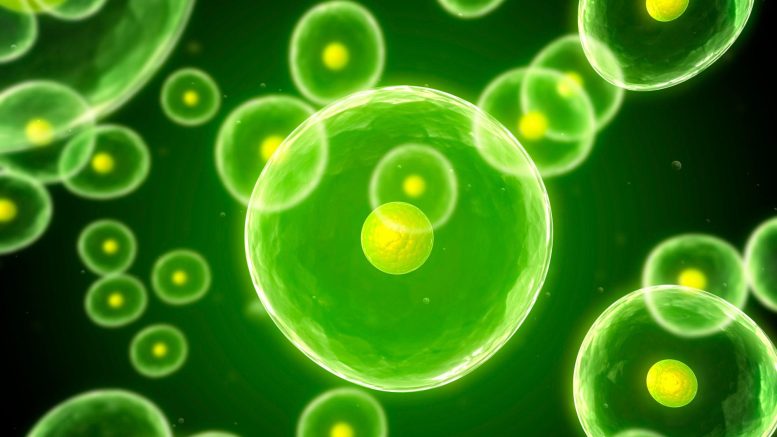
Biology April 10, 2024
Paradoxical Mechanisms Uncovered – Chemists Have Filled a Major Gap in the Origin of Life
Molecules often have a structural asymmetry called chirality, which means they can appear in alternative, mirror-image versions, akin to the left and right versions of…

Mini Kidneys Uncover Big Advances in Polycystic Kidney Disease Research
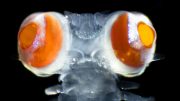
Discovery of Unusual Worm With Mammal-Like Vision Stuns Scientists

Scientists Identify Rare Gene Variants That Can Increase Your Risk of Obesity by up to 500%

Amphibian Apocalypse: Virus vs. Fungus in the Battle for Survival

Silent Screams: Unlocking the Mysteries of Ultrasonic Communication in Frogs

Motion Camouflage: The Remarkable Hunting Tactics of Trumpetfish

The Invisible World Half a Mile Under: Scientists Unveil Hidden Activity of Life Below Ground

Scientists Have Unveiled the Complete Library of Charles Darwin for the First Time

Biology April 7, 2024
Unlocking the Ocean’s Secrets With Four Decades of Canned Salmon
Using canned salmon, scientists studied anisakid roundworms to assess changes in Alaskan marine ecosystems over four decades, revealing insights into ecological health and the impact…
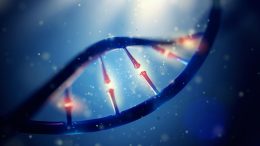
Frozen in Time: How a DNA Anomaly Misled Scientists for Centuries
An enormous meteor spelled doom for most dinosaurs 65 million years ago. But not all. In the aftermath of the extinction event, birds — technically…

Biology April 6, 2024
The Genetic Puzzle of Human Migration: Solved at Last?
All modern non-African human groups originated from ancestors who migrated out of Africa over 60,000 years ago. How long did it take for these separations…

New Stem Cell Research Offers First Glimpse of Early Human Development
It’s one of life’s most defining moments—that crucial step in embryonic development, when an indistinct ball of cells rearranges itself into the orderly three-layered structure…
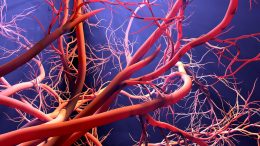
Scientists Discover That the Brain’s Blood Vessels Obey Different, Totally Unprecedented Rules
Cardiovascular diseases, such as heart attacks and strokes, stand as the top killers globally, taking approximately 18 million lives annually. This observation justifies the adage…

“Unheard of in Structural Biology” – New Research Unveils Enzymatic Keys to Immune System Regulation
Scientists at Scripps Research have developed atomic-level structural models of enzymes linked to autoimmune and inflammatory conditions, such as lupus and Alzheimer’s disease. When nucleic…

Biology April 5, 2024
Scientists Crack Centuries-Old Philosophical Question About Sight and Touch
Research shows that chicks just hatched are able to identify objects visually, despite only having encountered them through tactile sensations previously. Newly hatched chicks, reared…

Zombie Neurons and the Secrets of Our Brain’s Error-Correcting Code
Nestled at the back of your head, the cerebellum is a brain structure that plays a pivotal role in how we learn, adapting our actions…
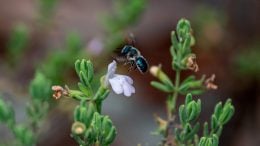
This Ancient Lineage of Cryptic Plants Is Millions of Years Old. They May Be Permanently Gone in Decades.
Scrub mints are among the most endangered plants you’ve probably never heard of. Over half of the existing 24 species are recognized as threatened or…
About Mentored Research Mentored Research involves working directly with a faculty member on a specific research project. These research experiences will help you deepen your understanding of biological principles while simultaneously building a strong resume. Together these will enable you to be successful, whether your pathway leads you to professional school, graduate programs, government work or even career not directly related to biology.
Getting Involved We strongly encourage all of our majors to get started with mentored research as soon as they are able. The first step is to find what sparks your curiosity and find a professor who shares it. Professors have dedicated a large part of their lives to research, and enjoy few things more than passing their skills and passion to new students. Most professors are extremely busy, so spend some time reading up on their research before you contact them. A little preparation goes a long way, and it pays to be proactive and put forth the initial effort. You can find professors' contact information here .
Funding Not all labs will have immediate funding to support all the interested undergraduates. However, Mentored Research (Bio494R) or Introduction to Mentored Research (Bio194) are excellent ways to get started in a lab. Often a professor will eventually pay students helping them with research. In some rare cases, professors don't provide financial compensation. One remedy is the College Undergraduate Research Awards (CURA). These are grants given exclusively to undergraduate students to help foster and encourage research. More information is available at http://lscura.byu.edu.
Ecology is the study of how living organisms, including humans, interact with each other and their physical environment. Students and faculty in the Biology Department study the ecology of organisms at multiple levels or organization; from individuals, populations, communities, and ecosystems, to the entire biosphere (global ecology). The study of ecology intersects with several closely related fields, including biogeography, biodiversity, evolutionary biology, developmental biology, physiology, genetics, animal behavior, geology, biochemistry, anthropology, and paleontology.
Currently, the Earth is being transformed at a high rate and in unprecedented ways. Human activities are causing widespread habitat loss and degradation, pollution, invasive species, land-use changes, and climate change. Human health and welfare depend on our ability to understand and mitigate these changes. Thus, the study of ecology has become one of the most critical and dynamic fields in all of the biological sciences.
Do we really need more ecologists? Yes! Fundamental principles of ecology are used to inform applications and careers in conservation biology, conservation genetics, wetland management, agriculture, forestry, fisheries, wildlife management, urban planning and human ecology, community health, emerging infectious diseases, epidemiology, and economics.
As the Earth faces mounting pressure to meet the needs of our growing population, people with an understanding of ecological principals and how to apply them to sustain life will wield the most important skills we’ll need to navigate our uncertain future.
Faculty who do research in this area: Byron Adams ; Evolutionary Ecology, Ecosystem Responses to Climate-Driven Environmental Change; Co-Evolution, Soil Ecology, Ecological & Evolutionary Genomics Richard Gill ; Plant Ecology and Global Change, Marine Ecology Blaine Griffen ; Marine Ecology, Behavioral Ecology, Physiological Ecology, Population and Community Ecology Jerry Johnson ; Evolutionary Ecology, Behavioral Ecology Riley Nelson ; Freshwater Ecology Steve Peck ; Theoretical Ecology, Movement Ecology Russell Rader ; Aquatic Ecology
Evolutionary Biology is a sub-discipline in Biology that studies the forces that shape earth's variety of life forms, or biodiversity. There are several different forces or mechanisms that drive evolution. Natural selection is one of these major forces (and perhaps the most well-known), but there are others, including mutation, genetic drift, migration, and nonrandom mating. Collectively, these mechanisms influence how populations of organisms change over time -- how they evolve. One of the central tenets of evolution is that different species share common ancestry. Similar to how a family tree illustrates how individuals are descended from or related to others, the many species that currently live on the earth are related by descent from common ancestors. Evolutionary biology uses morphological (structural features of an organism), ecological, molecular, geographical, and behavioral data to study species relationships and understand what our planet's biodiversity used to be, how it became what it is now, and even make predictions about what it will look like in the future. As the unifying theory in Biology, evolution helps scientists understand more about the living things around us.
Faculty who do research in this area: Byron Adams ; Evolutionary Ecology; Co-Evolution, Soil Ecology, Ecological & Evolutionary Genomics Mark Belk ; Life History Evolution Seth Bybee ; Evolutionary Biology Jamie Jensen ; Evolution Acceptance Jerry Johnson ; Evolutionary Ecology, Life History Evolution Leigh Johnson , Evolution Steve Peck ; Evolution & Ecology Steve Leavitt ; Evolution Clint Whipple ; Evolution and Genetics of Plant Development Michael Whiting ; Bioinformatics Evolution
Education research, broadly, refers to the study of education and learning. Education researchers may focus on individuals, groups/classes, instructors, institutions and their interactions to investigate how they impact formal or informal teaching and learning. Biology education research is a type of discipline-based education research, where education research is conducted in the context of a specific field (its worldview, knowledge, and practices) and by content experts. Faculty and students in the Biology Department use their biology content expertise as well as training in broad learning theories and pedagogy to inform their biology education research. Discipline-based education research can focus on K-12 education, higher education, or informal education, although faculty in the Biology Department primarily focus on higher education.
Biology education research can answer a broad range of questions using a diverse set of methods. Goals of biology education researchers may include testing specific learning theories and constructing new models of effective teaching and learning in biology contexts, developing and testing evidence-based practices to improve biology teaching and learning, investigating the nature of biology expertise in specific sub-disciplines and how that expertise is developed, studying the experiences of marginalized groups in science and proposing practices to broaden participation and success, and more. Researchers may use experimental, quasi-experimental, observational, or design-based methods, and they may use quantitative and/or qualitative analysis techniques depending on the research question.
Biology education research is an exciting field that allows students to learn more about effective teaching and learning in the context of biology topics they are learning about in their coursework. Students also develop scientific skills such as study design, data collection, statistical and/or qualitative analysis, and written and verbal science communication.
Faculty who do research in this area: Liz Bailey ; Gender Gaps in Biology Education, Reciprocal Peer Tutoring, Course Structures/Assessments that Promote Growth Mindset, and Integration of Math and Biology Richard Gill ; Minority Representation in STEM Jamie Jensen ; Reconciliation of Science and Religion, STEM Faculty Development, Science Communication, Best Practices in Pedagogy Riley Nelson ; Science Education Stephen Piccolo ; Bioinformatics Education Josh Stowers ; Secondary Education
At BYU we have professors and researchers working with insects and their relatives in all these ways. BYU offers several courses where insects are the exact focus of the entire class and most classes in biology include them or should include them in the general
Entomology is the study of insects and their relatives. Flies, beetles, lacewings, bees, ants, centipedes, butterflies, dragonflies, and earwigs are all fair game for study. Our best estimates show 1.5 million species have been given names, more than all other animals combined. Related estimates are that only 10% of the species of insects on Earth have been given formal scientific names. So much more basic work needs to be done, if only to name them.
In addition to this taxonomic richness, they play key parts in most ecosystems and their inherent diversity makes them model organisms for all biologists in the study of evolution, genetics, ecology, and physiology. An entomologist is a person who studies these diverse animals using morphological, molecular, and behavioral techniques.
Insects are beautiful and many have been recognized in human culture as sources of both admiration and disdain. Consider the paintings, poetry, scriptures, and windshield smashes you have seen, read, or heard.
But wait, on the positive side insects are extremely important as pollinators of much of our human food and provide direct food for humans in the form of honey. Their entire bodies are eaten and relished in many cultures.
On the negative side insects destroy large proportions of the food we would like to eat with our burgeoning populations. Insects also pass on smaller organisms that cause disease for our own human bodies. The diseases they carry can harm the crops, pets, livestock, forests, lawns, and wildlands we cherish.
Insects can be studied for their own sake. Scientists refer to this as basic research. Outcomes of basic research may or may not yield solutions to human problems: the goal here is increasing overall knowledge. And yet those increases might be used later in solving problems. . .
And of course, we need to study insects to discover their roles in enhancing and harming humans. This is called applied research where an exact insect situation is studied with goals to find ways to either control the bad outcomes or enhance the good ones.
Faculty who do research in this area: Seth Bybee ; Entomology Shawn Clark ; Insect Systematics and Museum Curation Robert Johnson ; Plant-insect interactions Riley Nelson ; Insect Biodiversity Michael Whiting ; Entomology
Plant biologists study the many fascinating aspects of green life! As the only organisms with the ability to take carbon dioxide gas and turn it into carbohydrates, plants form the basis of our diets, provide feed for livestock, fuel our modern amenities (yes, coal and oil are just dead plants), make up the fibers in our clothing, give us lumber for building, and are the source of many pharmaceuticals.
Plant biologists are involved in many interesting areas. Plant taxonomists seek to understand the relationship between plant species and often discover new ones. They often also catalog the natural world to help us understand where specific plants are found. Plant geneticists seek to understand the genetic mechanisms by which plants grow and develop their individual traits. Geneticists are involved in helping us understand the fundamental basis of life, and they also do important work developing healthier, more sustainable crops. Plant biologists’ work often overlaps with ecologists, evolutionary biologists, bioinformaticians, molecular biologists, chemists, agronomists, and farmers.
So, whether you are looking to get your hand dirty, work with cutting edge science, or both, plant biology is a great place to be!
Faculty who do research in this area: Leigh Johnson ; Plant Systematics, Taxonomy & Species Delimination Robert Johnson ; Plant Systematics, Floristics, Plant-insect interactions Clint Whipple ; Evolution and Genetics of Plant Development
The incredible diversity of life on earth is invaluable. It is the key to adaptation to changes, creates resilient ecosystems, provides foundational ecosystem services, can broaden our perspective of the complexities of the world around us, and provides opportunities for spiritual growth and connection. While doing research, students are prepared to (1) understand principles that influence biodiversity, particularly those that create and those that reduce it, (2) document and preserve the diversity of life on the planet, in addition to the ecosystem services they support, and (3) develop a more comprehensive perspective of the world around us by considering the range of all life.
Human activities are presently causing widespread habitat loss and degradation, pollution, invasive species, land-use changes, and climate change. These activities have resulted in what is called the “Sixth Mass Extinction”, with estimated extinction rates at 100 to 1,000 times higher than the background rate. Human health and welfare depend on our ability to understand and mitigate these changes. Beyond human health, protecting earth’s diversity comprises foundational ethical and spiritual dimensions. Thus, the study of biodiversity and conservation has become one of the most critical, relevant, and dynamic fields across all disciplines.
Students and faculty in the Biology Department study biodiversity and conservation at multiple levels - from genetic diversity (the variety of genetic information contained in all organisms) to species diversity (the variety of different living species) to ecosystem diversity (the variety of habitats, the species that live in the habitat, and ecological processes). Here, our study of biodiversity and conservation intersects with several closely related fields, including biogeography, ecology, evolutionary biology, developmental biology, physiology, genetics, geology, biochemistry, and others.
Students are encouraged to engage in original, transformative research. With dedicated, passionate faculty mentors, students can explore topics ranging from documenting diversity to improving conservation and management strategies to developing improved educational practices to promote biodiversity and conservation. As we face mounting pressure to envision new ways to protect, promote, and value earth’s biodiversity, people with an understanding of biodiversity and principals of conservation will wield the most important skills we’ll need to navigate our uncertain future.
Faculty who do research in this area: Byron Adams Mark Belk ; Conservation of Fishes Seth Bybee Shawn Clark Richard Gill Blaine Griffen ; Conservation Biology and Extinction Jerry Johnson Leigh Johnson Robert Johnson Steve Leavitt ; Lichens, Holobionts, Diversity in arid or extreme environments Riley Nelson ; Insect Biodiversity Steve Peck Russell Rader ; Invasion Biology, Restoration, Conservation Clinton Whipple Michael Whiting
Bioinformatics research has several focus areas including (but not limited to) using machine-learning algorithms to clarify relationships between molecular measurements in tumors and cancer-patient outcomes, building software tools to aid biologists in their efforts to analyze biological data, and identifying pedagogical approaches that enable students to learn fundamental bioinformatics and biostatistics skills. Students in bioinformatics labs work on a variety of projects. Some projects are hypothesis driven and focus on analyzing data (typically from public repositories). Other projects are software focused--students write code and create open-source software. Other projects are experiment-driven, especially using classroom interventions to try new teaching techniques.
Faculty who do research in this area: Byron Adams ; Ecological & Evolutionary Genomics Matt Bailey ; Cancer and Genomics Seth Bybee ; Systematics and Bioinformatics Leigh Johnson ; Population Genetics Sam Payne ; Bioinformatics and Proteomics Stephen Piccolo ; Bioinformatics, Genomics, Human Disease (especially cancer), Data Science Perry Ridge ; Bioinformatics Methods, Alzheimer's disease, Genome Biology, Human Genetics John Sproul ; Biodiversity, Repetitive DNA, Rapid Genome Evolution Michael Whiting ; Bioinformatics Evolution Clint Whipple ; Genetics of Plant Development Edward Wilcox ; DNA Sequencing
Adams Lab - Evolutionary Ecology Bybee Lab Gill Lab - Ecology Griffen Lab - Marine Ecology Jensen Lab - Reconciling Evolution Jerry Johnson Lab - Evolutionary Ecology Kauwe Lab Leavitt Lab - Lichenology Nelson Lab Payne Lab - Bioinformatics and Proteomics Piccolo Lab - Bioinformatics Sproul Lab - Evolutionary Biology Whipple Lab - Evolution of Plant Developmental Mechanisms Whiting Lab DNA Sequencing Center
- See us on facebook
- See us on twitter
- See us on youtube
- See us on linkedin
- See us on instagram
Stanford Medicine study flags unexpected cells in lung as suspected source of severe COVID
A previously overlooked type of immune cell allows SARS-CoV-2 to proliferate, Stanford Medicine scientists have found. The discovery has important implications for preventing severe COVID-19.
April 10, 2024 - By Bruce Goldman
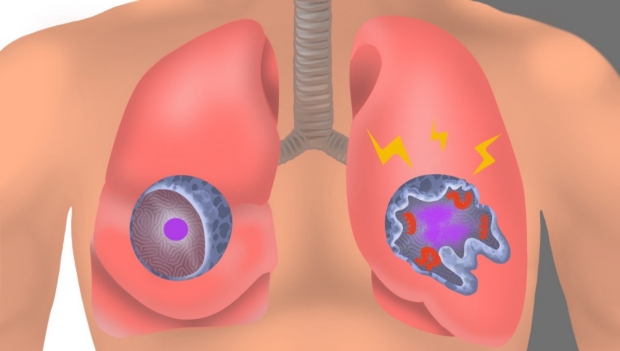
In an uninfected interstitial macrophage, the nucleus (purple) and outer cell membrane (blue) are intact. In an infected interstitial macrophage, the nucleus is shattered, copious newly made viral components (red) clump together, and the cell broadcasts inflammatory and scar-tissue-inducing chemical signals (yellow). Emily Moskal
The lung-cell type that’s most susceptible to infection by SARS-CoV-2, the virus that causes COVID-19, is not the one previously assumed to be most vulnerable. What’s more, the virus enters this susceptible cell via an unexpected route. The medical consequences may be significant.
Stanford Medicine investigators have implicated a type of immune cell known as an interstitial macrophage in the critical transition from a merely bothersome COVID-19 case to a potentially deadly one. Interstitial macrophages are situated deep in the lungs, ordinarily protecting that precious organby, among other things, engorging viruses, bacteria, fungi and dust particles that make their way down our airways. But it’s these very cells, the researchers have shown in a study published online April 10 in the Journal of Experimental Medicine , that of all known types of cells composing lung tissue are most susceptible to infection by SARS-CoV-2.
SARS-CoV-2-infected interstitial macrophages, the scientists have learned, morph into virus producersand squirt out inflammatory and scar-tissue-inducing chemical signals, potentially paving the road to pneumonia and damaging the lungs to the point where the virus, along with those potent secreted substances, can break out of the lungs and wreak havoc throughout the body.
The surprising findings point to new approaches in preventing a SARS-CoV-2 infection from becoming a life-threatening disease. Indeed, they may explain why monoclonal antibodies meant to combat severe COVID didn’t work well, if at all — and when they did work, it was only when they were administered early in the course of infection, when the virus was infecting cells in the upper airways leading to the lungs but hadn’t yet ensconced itself in lung tissue.
The virus surprises
“We’ve overturned a number of false assumptions about how the virus actually replicates in the human lung,” said Catherine Blish , MD, PhD, a professor of infectious diseases and of microbiology and immunology and the George E. and Lucy Becker Professor in Medicine and associate dean for basic and translational research.
Blish is the co-senior author of the study, along with Mark Krasnow , MD, PhD, the Paul and Mildred Berg Professor of biochemistry and the Executive Director of the Vera Moulton Wall Center for pulmonary vascular disease.
“The critical step, we think, is when the virus infects interstitial macrophages, triggering a massive inflammatory reaction that can flood the lungs and spread infection and inflammation to other organs,” Krasnow said. Blocking that step, he said, could prove to be a major therapeutic advance. But there’s a plot twist: The virus has an unusual way of getting inside these cells — a route drug developers have not yet learned how to block effectively — necessitating a new focus on that alternative mechanism, he added.

Catherine Blish
In a paper published in Nature in early 2020, Krasnow and his colleagues including then-graduate student Kyle Travaglini, PhD — who is also one of the new study’s co-lead authors along with MD-PhD student Timothy Wu — described a technique they’d worked out for isolating fresh human lungs; dissociating the cells from one another; and characterizing them, one by one, on the basis of which genes within each cell were active and how much so. Using that technique, the Krasnow lab and collaborators were able to discern more than 50 distinct cell types, assembling an atlas of healthy lung cells.
“We’d just compiled this atlas when the COVID-19 pandemic hit,” Krasnow said. Soon afterward, he learned that Blish and Arjun Rustagi , MD, PhD, instructor of infectious diseases and another lead co-author of the study, were building an ultra-safe facility where they could safely grow SARS-CoV-2 and infect cells with it.
A collaboration ensued. Krasnow and Blish and their associates obtained fresh healthy lung tissue excised from seven surgical patients and five deceased lung donors whose lungs were virus-free but for one reason or another not used in transplants. After infecting the lung tissue with SARS-CoV-2 and waiting one to three days for the infection to spread, they separated and typed the cells to generate an infected-lung-cell atlas, analogous to the one Krasnow’s team had created with healthy lung cells. They saw most of the cell types that Krasnow’s team had identified in healthy lung tissue.
Now the scientists could compare pristine versus SARS-CoV-2-infected lungs cells of the same cell type and see how they differed: They wanted to know which cells the virus infected, how easily SARS-CoV-2 replicated in infected cells, and which genes the infected cells cranked up or dialed down compared with their healthy counterparts’ activity levels. They were able to do this for each of the dozens of different cell types they’d identified in both healthy and infected lungs.
“It was a straightforward experiment, and the questions we were asking were obvious,” Krasnow said. “It was the answers we weren’t prepared for.”
It’s been assumed that the cells in the lungs that are most vulnerable to SARS-CoV-2 infection are those known as alveolar type 2 cells. That’s because the surfaces of these cells, along with those of numerous other cell types in the heart, gut and other organs, sport many copies of a molecule known as ACE2. SARS-CoV-2 has been shown to be able to grab onto ACE2 and manipulate it in a way that allows the virus to maneuver its way into cells.
Alveolar type 2 cells are somewhat vulnerable to SARS-CoV-2, the scientists found. But the cell types that were by far the most frequently infected turned out to be two varieties of a cell type called a macrophage.
Virus factories
The word “macrophage” comes from two Greek terms meaning, roughly, “big eater.” This name is not unearned. The air we inhale carries not only oxygen but, unfortunately, tiny airborne dirt particles, fungal spores, bacteria and viruses. A macrophage earns its keep by, among other things, gobbling up these foreign bodies.

Mark Krasnow
The airways leading to our lungs culminate in myriad alveoli, minuscule one-cell-thick air sacs, whichare abutted by abundant capillaries. This interface, called the interstitium, is where oxygen in the air we breathe enters the bloodstream and is then distributed to the rest of the body by the circulatory system.
The two kinds of SARS-CoV-2-susceptible lung-associated macrophages are positioned in two different places. So-called alveolar macrophages hang out in the air spaces within the alveoli. Once infected, these cells smolder, producing and dribbling out some viral progeny at a casual pace but more or less keeping a stiff upper lip and maintaining their normal function. This behavior may allow them to feed SARS-CoV-2’s progression by incubating and generating a steady supply of new viral particles that escape by stealth and penetrate the layer of cells enclosing the alveoli.
Interstitial macrophages, the other cell type revealed to be easily and profoundly infected by SARS-CoV-2, patrol the far side of the alveoli, where the rubber of oxygen meets the road of red blood cells. If an invading viral particle or other microbe manages to evade alveolar macrophages’ vigilance, infect and punch through the layer of cells enclosing the alveoli, jeopardizing not only the lungs but the rest of the body, interstitial macrophages are ready to jump in and protect the neighborhood.
At least, usually. But when an interstitial macrophage meets SARS-CoV-2, it’s a different story. Rather than get eaten by the omnivorous immune cell, the virus infects it.
And an infected interstitial macrophage doesn’t just smolder; it catches on fire. All hell breaks loose as the virus literally seizes the controls and takes over, hijacking a cell’s protein- and nucleic-acid-making machinery. In the course of producing massive numbers of copies of itself, SARS-CoV-2 destroys the boundaries separating the cell nucleus from the rest of the cell like a spatula shattering and scattering the yolk of a raw egg. The viral progeny exit the spent macrophage and move on to infect other cells.
But that’s not all. In contrast to alveolar macrophages, infected interstitial macrophages pump out substances that signal other immune cells elsewhere in the body to head for the lungs. In a patient, Krasnow suggested, this would trigger an inflammatory influx of such cells. As the lungs fill with cells and fluid that comes with them, oxygen exchange becomes impossible. The barrier maintaining alveolar integrity grows progressively damaged. Leakage of infected fluids from damaged alveoli propels viral progeny into the bloodstream, blasting the infection and inflammation to distant organs.
Yet other substances released by SARS-CoV-2-infected interstitial macrophages stimulate the production of fibrous material in connective tissue, resulting in scarring of the lungs. In a living patient, the replacement of oxygen-permeable cells with scar tissue would further render the lungs incapable of executing oxygen exchange.
“We can’t say that a lung cell sitting in a dish is going to get COVID,” Blish said. “But we suspect this may be the point where, in an actual patient, the infection transitions from manageable to severe.”
Another point of entry
Compounding this unexpected finding is the discovery that SARS-CoV-2 uses a different route to infect interstitial macrophages than the one it uses to infect the other types.
Unlike alveolar type 2 cells and alveolar macrophages, to which the virus gains access by clinging to ACE2 on their surfaces, SARS-CoV-2 breaks into interstitial macrophages using a different receptor these cells display. In the study, blocking SARS-CoV-2’s binding to ACE2 protected the former cells but failed to dent the latter cells’ susceptibility to SARS-CoV-2 infection.
“SARS-CoV-2 was not using ACE2 to get into interstitial macrophages,” Krasnow said. “It enters via another receptor called CD209.”
That would seem to explain why monoclonal antibodies developed specifically to block SARS-CoV-2/ACE2 interaction failed to mitigate or prevent severe COVID-19 cases.
It’s time to find a whole new set of drugs that can impede SARS-CoV-2/CD209 binding. Now, Krasnow said.
The study was funded by the National Institutes of Health (grants K08AI163369, T32AI007502 and T32DK007217), the Bill & Melinda Gates Foundation, Chan Zuckerberg Biohub, the Burroughs Wellcome Fund, Stanford Chem-H, the Stanford Innovative Medicine Accelerator, and the Howard Hughes Medical Institute.

About Stanford Medicine
Stanford Medicine is an integrated academic health system comprising the Stanford School of Medicine and adult and pediatric health care delivery systems. Together, they harness the full potential of biomedicine through collaborative research, education and clinical care for patients. For more information, please visit med.stanford.edu .
Artificial intelligence
Exploring ways AI is applied to health care

- Alzheimer's disease & dementia
- Arthritis & Rheumatism
- Attention deficit disorders
- Autism spectrum disorders
- Biomedical technology
- Diseases, Conditions, Syndromes
- Endocrinology & Metabolism
- Gastroenterology
- Gerontology & Geriatrics
- Health informatics
- Inflammatory disorders
- Medical economics
- Medical research
- Medications
- Neuroscience
- Obstetrics & gynaecology
- Oncology & Cancer
- Ophthalmology
- Overweight & Obesity
- Parkinson's & Movement disorders
- Psychology & Psychiatry
- Radiology & Imaging
- Sleep disorders
- Sports medicine & Kinesiology
- Vaccination
- Breast cancer
- Cardiovascular disease
- Chronic obstructive pulmonary disease
- Colon cancer
- Coronary artery disease
- Heart attack
- Heart disease
- High blood pressure
- Kidney disease
- Lung cancer
- Multiple sclerosis
- Myocardial infarction
- Ovarian cancer
- Post traumatic stress disorder
- Rheumatoid arthritis
- Schizophrenia
- Skin cancer
- Type 2 diabetes
- Full List »
share this!
April 10, 2024
This article has been reviewed according to Science X's editorial process and policies . Editors have highlighted the following attributes while ensuring the content's credibility:
fact-checked
trusted source
Filling in genomic blanks for disease studies works better for some groups than others
by Wayne Lewis, Keck School of Medicine of USC

Understanding how genetics affect health is an essential first step toward treating and preventing a host of diseases. New knowledge often comes from genome-wide association studies identifying variations in the genetic code linked with conditions such as cancer and autoimmune disease. The more people's DNA and health histories that are examined in such research, the more likely genetic and biological insights can be garnered.
However, cost can be a major barrier: Comprehensively sequencing one person's genome costs about $500 to $1000, a price point often infeasible when applied to several tens of thousands of study participants. So instead, researchers generally focus on key spots where the genetic code tends to vary among different individuals, through genotyping, which costs about $100 per participant. A statistical method called genotype imputation then helps them fill in the genetic blanks based on existing reference panels of fully sequenced genomes.
A new Keck School of Medicine of USC study appearing in the American Journal of Human Genetics identifies a disparity in how well imputation works for different populations.
The researchers found that the technique holds up nicely for well-represented groups with European ancestry, as well as for African Americans and Latinos, who have been the subject of recent, concerted efforts to increase representation in sequencing reference panels. However, the researchers found that imputation is far less reliable for other groups, generally doing worse for populations farther away from Europe, except for Africa and Latin America.
"These global populations are not being imputed as well, meaning that we have a lot more error in filling in missing parts of the genome," said corresponding author Charleston Chiang, Ph.D., associate professor of population and public health sciences and associate director at the Keck School of Medicine's Center for Genetic Epidemiology. "That means the analysis using these imputed data doesn't work as well. And because researchers filter based on the reliability of imputation, we end up having data for diverse populations with more errors and more holes, leading to less effective study designs."
Reaching outside of a health science field to examine inequities
Chiang notes that the uniqueness of this study lies in the breadth of the study, where the team evaluated over a hundred global populations for issues with imputation. This has not been previously demonstrated because of the general lack of diversity of available cohorts as well as in reference panels of fully sequenced genomes. This presented a hurdle for understanding how well diverse groups fare with imputation in genetic epidemiology studies.
So the research team took a unique approach, borrowing genetic datasets from population genetics , a related field focused on understanding the history and evolution of a wide variety of populations, with less of a focus on disease.
In all, the scientists combined genomic sequencing data from 23 studies including more than 43,000 people from 123 distinct global populations. They matched each population with a control group of European ancestry and used a standard metric that doesn't require full genomic sequences—which is normally the case in genome-wide association studies —to compare the reliability of imputation.
Imputation for populations based in places such as Papua New Guinea, Thailand, Vietnam and Saudi Arabia was substantially less accurate than for populations of European descent. Chiang and his colleagues also plotted the relative reliability of imputation for different groups on a world map that is available online . Imputation for populations based in Asia, Australia, New Zealand and the Pacific Islands generally showed less accuracy.
The team also compared the main metric for the reliability of imputation used to arrive at these findings with a better metric that only works when full sequencing data is available. They found that the main metric is biased so that it overestimates the accuracy of imputation for populations other than people of European ancestry. This suggests that the flaws in imputation are more serious still than indicated by the researchers' results.
Potential steps to make genome-wide association studies more equitable
The solution for the disparity highlighted in the study is straightforward, yet far from simple to achieve.
"We need to sequence more, and be more inclusive in the individuals who participate in studies," said Chiang, who also holds an appointment in quantitative and computational biology at USC Dornsife College and is a member of USC Norris Comprehensive Cancer Center.
One promising sign is that genomic sequencing has become more affordable in recent years and is expected to continue to do so. But cost isn't the only concern that must be addressed. Efforts are needed to earn the trust from diverse communities so they are not hesitant to participate.
In some cases, more diversity can complicate genome-wide association studies, particularly in smaller studies, even confounding their findings if the diversity is not properly accounted for or characterized. This creates pressure for scientists to exclude a smaller subset of populations in their data and choose from groups with more members.
Chiang advocates for a sort of balance.
"As the studies get bigger and bigger, the way that scientists view and analyze these data needs to evolve toward looking at genetic ancestry as more of a continuum," he said. "If we can start to view everyone as related and branching off the same genetic tree at different places, according to their history, we can incorporate more people and more diversity.
"Of course, there are valuable reasons to study discrete populations," he continued. "Group identity can be useful to maintain, for example when studying the social determinants of health that affect what people experience in their daily lives. We need to continue studying particular populations in isolation, but in the long term, we need to be able to reconcile between the two approaches."
The study's first author, USC undergraduate Jordan Cahoon, hopes that by beginning to quantify disparities baked into genome-wide association studies, the team's work will influence future solutions.
"It's important to understand the weaknesses in the field in terms of equity and fairness," said Cahoon, a graduating senior majoring in computer science at the USC Viterbi School of Engineering. "I'm hoping that this study will be a good resource for scientists, so they can see how well the populations they're sequencing are doing in comparison to others."
Other co-authors are Xinyue Rui, Echo Tang, Christopher Simons, Jalen Langie, Minhui Chen and Ying-Chu Lo, all of USC.
Explore further
Feedback to editors

Study finds esketamine injection just after childbirth reduces depression in new mothers
39 minutes ago

A new screening protocol can detect aggressive prostate cancers more selectively
2 hours ago

How a new drug prototype regenerates lung tissue

Why some people with rheumatoid arthritis have pain without inflammation
3 hours ago

Researchers show chemical found naturally in cannabis may reduce anxiety-inducing effects of THC

'Virtual biopsy' lets clinicians analyze skin noninvasively
4 hours ago

Research team discovers new way to generate human cartilage

Researchers find new origin of deep brain waves

Study suggests liquid biopsy could detect and monitor aggressive small-cell lung cancer

Analysis finds mixed diets balance nutrition and reduce carbon footprints
5 hours ago
Related Stories

Researchers identify novel genetic variants associated with Alzheimer's disease
Mar 21, 2024

Study finds ancestry-driven disparities in pathogenic variation
Feb 21, 2024

Researchers optimize genetic tests for diverse populations to tackle health disparities
Feb 19, 2024

Publication of 2,000 canine genomes provides toolkit for translational research
Aug 18, 2023

Researchers expand and upgrade the 1000 Genomes Project resource using whole-genome sequencing
Sep 1, 2022

New study highlights need for ethnic and ancestral diversity in genomic research
Jun 19, 2019
Recommended for you

Newly found genetic variant defends against Alzheimer's disease
7 hours ago

Researchers explore role of androgens in shaping sex differences
8 hours ago

New insight into combating drug-resistant prostate cancer
9 hours ago

Study highlights impact of aldehydes on DNA damage and aging
14 hours ago

Mouse study uncovers how altered gene expression can induce autism
Apr 9, 2024
Let us know if there is a problem with our content
Use this form if you have come across a typo, inaccuracy or would like to send an edit request for the content on this page. For general inquiries, please use our contact form . For general feedback, use the public comments section below (please adhere to guidelines ).
Please select the most appropriate category to facilitate processing of your request
Thank you for taking time to provide your feedback to the editors.
Your feedback is important to us. However, we do not guarantee individual replies due to the high volume of messages.
E-mail the story
Your email address is used only to let the recipient know who sent the email. Neither your address nor the recipient's address will be used for any other purpose. The information you enter will appear in your e-mail message and is not retained by Medical Xpress in any form.
Newsletter sign up
Get weekly and/or daily updates delivered to your inbox. You can unsubscribe at any time and we'll never share your details to third parties.
More information Privacy policy
Donate and enjoy an ad-free experience
We keep our content available to everyone. Consider supporting Science X's mission by getting a premium account.
E-mail newsletter
- International edition
- Australia edition
- Europe edition

Touch can reduce pain, depression and anxiety, say researchers
More consensual touch helps ease or buffer against mental and physical complaints, meta-analysis shows
Whether it is a hug from a friend or the caress of a weighted blanket, the sensation of touch appears to bring benefits for the body and mind, researchers say.
The sense of touch is the first to develop in babies and is crucial in allowing us to experience the environment around us as well as communicate. Indeed, the loss of touch from others during the Covid pandemic hit many hard.
However, while myriad studies have suggested touch is beneficial for our health, few have attempted to draw the vast field of research together.
Now experts have done just that, revealing a simple message: touch helps.
Dr Helena Hartmann, a co-author of the research from University Hospital Essen , said: “More consensual touch events throughout our day can help alleviate or potentially buffer against mental and physical complaints.”
Published in the journal Nature Human Behaviour , the research encompassed 212 previously published studies and included a statistical analysis of 85 studies involving adults and 52 involving newborns.
Among the results, the team found touch was just as beneficial for mental health as physical health – a finding that held for adults and newborns – although touch had a bigger impact on some areas than others.
“Our work illustrates that touch interventions are best suited for reducing pain, depression and anxiety in adults and children as well as for increasing weight gain in newborns,” the researchers write.
The analysis revealed humans gained similar benefits in terms of their physical health when touched by other humans as by objects – such as social robots or weighted blankets.
Hartmann said that was a surprise. “This means we need to undertake more research on the potential of weighted blankets or social robots to improve people’s wellbeing, especially during contact-limiting situations like the recent Covid-19 pandemic,” she said.
The positive impact on mental health was larger for human touch than touch from objects – possibly, the team said, because it involved skin-to-skin contact.
Among other results, the team found touch was beneficial for both healthy and unwell people, although the impact was larger among the latter for mental health benefits.
The type of touch and its duration was not important, although greater frequency was associated with greater benefits in adults.
Further, touching the head was associated with greater health benefits than touching other parts of the body.
The team cautioned that some of the findings could be false positives, while it was not clear if they would hold across different cultures.
Dr Mariana von Mohr, from Royal Holloway, University of London, who was not involved in the work, said if future robots could more accurately replicate the texture and warmth of human skin, they may be able to provide comparable mental health benefits to human touch.
“[These properties are] important because our skin contains specialised sensors, known as C-tactile afferents, which are particularly receptive to gentle, caressing touch and temperature similar to that of human skin, factors that are also thought to facilitate emotional regulation,” she said.
Prof Katerina Fotopoulou, at University College London, said the research gave a bird’s-eye view of the benefits of touch interventions on health.
She cautioned that the work could not offer more specific conclusions, such as the particular types of touch that may be associated with specific health benefits.
Dr Susannah Walker, at Liverpool John Moores University, agreed, noting that many of the studies considered were small and included varied types of touch and different measures of their outcomes. “This means it is hard to draw firm conclusions about why they work,” she said.
Fotopoulou added that the research could fuel new work in the field, including how touch could be used alongside other treatments.
“It is a historical misfortune that we have prioritised talking over touch or other somatic therapies in the past couple of centuries. This review gives us the necessary emphasis and confidence to redress this balance with further, careful study on touch interventions,” she said.
- Medical research
- Mental health
- Neuroscience
Most viewed
Find Info For
- Current Students
- Prospective Students
- Research and Partnerships
- Entrepreneurship and Commercialization
Quick Links
- Health and Life Sciences
- Info Security and AI
- Transformative Education
- Purdue Today
- Purdue Global
- Purdue in the News
April 10, 2024
Cloudy science, clear insights: Atmospheric scientist studies clouds’ causes and effects

Atmospheric scientist and cloud expert Alexandria Johnson creates clouds in her lab to study atmospheric phenomena on Earth and in faraway skies. (Purdue University photo/Kelsey Lefever)
Cloud formation and behavior in lab teach researchers about Earth, other planets
WEST LAFAYETTE, Ind. — Every cloud is lined, not with silver, but with science — at least from cloud expert Alexandria Johnson’s point of view.
Clouds are ubiquitous. They are one of the most notable characteristics of planet Earth. Studying them is akin to studying the blood and arteries of the planet itself. Johnson , an atmospheric scientist and assistant professor in Purdue University’s College of Science , studies clouds wherever they are: in her lab, on Earth, throughout the solar system and into the galaxy.
“The coolest thing about my research is that I can see clouds every day,” Johnson said. “I can look up into our own atmosphere and watch them change and evolve. Then I can take that knowledge and apply it to other planetary bodies, both within and outside our solar system.”
The science of clouds covers a lot of ground, and her research often reveals the unexpected. How to make theories about the surface of a planet from its cloudy atmosphere, for example. Or the fact that almost every milliliter of raindrops, even in the landlocked Midwest, contains a shocking amount of microplastics.
ADDITIONAL INFORMATION
- Purdue expert: Cloud research
- Billions of years ago, Venus may have had a key Earthlike feature (New York Times article, subscription required)
- Four EAPS professors chosen by NASA to study lunar science
Raining buckets and pouring plastics
Like a pearl forming around a speck of sand, clouds coalesce around motes of matter called nuclei. Usually, these nuclei are made of material from outside the atmosphere: a bit of space dust from a meteor skimming the atmosphere or a speck of sand kicked up from the Earth’s surface. But a new type of nuclei is beginning to play a role in natural systems: microplastics.
“Plastic doesn’t degrade,” Johnson said. “It just breaks down into smaller and smaller pieces that show up in our environments. We have found these microplastics everywhere on the planet, even in remote regions like national parks and Antarctica. However, they are found most densely where humans are because we are the source of the plastic.”
Johnson and her team, including Gouri Prabhakar, assistant professor of practice in the Department of Earth, Atmospheric, and Planetary Sciences , collected samples from several large rain and snow events at Purdue’s Agronomy Center for Research and Education in 2023. And they’ve started looking through the samples for something to catch their eyes: brightly colored blips of plastic. They have identified microplastics in every sample they’ve studied. They are now using a scanning electron microscope to find even smaller plastic pieces and better understand their properties.
Microplastics are a health and environmental concern across the globe, but most research has focused on plastics in animals’ bodies or in bodies of water. Johnson and her team are among the first to see that some of that plastic is falling from the sky in the Midwest and link it to clouds and precipitation.
“In a pristine state, plastic is hydrophobic and won’t act as cloud nuclei,” Johnson said. “However, if these microplastics reside in the environment long enough, they can become coated in organics, after which they may act as a cloud condensation or ice nuclei. These aged microplastics could be affecting clouds and precipitation patterns, the effects of which will grow with time as the number of microplastics in our environment increases.”
How to catch a cloud and pin it down
Clouds are difficult to study. They are, by definition, nebulous as well as enormous, and far from the comfortable climes where humans spend their lives. But understanding how they form and their physics are key to understanding weather, precipitation patterns and the planet itself.
Johnson’s solution is to grow her own clouds in her lab in the Department of Earth, Atmospheric, and Planetary Sciences. She uses minimalistic models to capture the dynamics of the systems, stripping them down to their basics to get a clear understanding on how the particles that make up clouds form, develop and interact with their environment. Using decidedly nonphotogenic setups of mostly lasers and big black boxes, Johnson’s studies show how the behavior of these lab-based cloud particles mimics the behavior of cloud particles in massive sky-sweeping clouds, only in miniature.
“Of course, we don’t grow them at quite the same scale you see in an atmosphere,” Johnson said. “Instead, we take one particle that is representative of a cloud, pump in different gases, change the temperature and pressure of the system. We then watch as that particle grows, shrinks or changes phase with time, all of which are processes that happen in clouds everywhere.”
The particles that act as the nuclei of Johnson’s lab-grown clouds, like most particles, have a charge. Johnson and her team use an electric field to levitate and contain the individual particles so they can’t move around. These particles are then stable for extended periods, which enables long-term research experiments — sometimes they stick around long enough to earn names. The scientists vary the pressure, temperature, electric field and laser illumination and study how the cloud particle reacts. Other methods build upon these to allow the team to look at groups of particles and observe how they scatter and polarize light.
Johnson can extrapolate from these systems to understand how different conditions lead to certain cloud types and behaviors. Like aeronautical engineers using a wind tunnel to observe how currents move around structures, Johnson uses these particles to understand the microphysics that underpin vast and complex systems.
Many scientists — climatologists, meteorologists and planetary scientists, to name a few — study clouds as part of their broader research. But Johnson is one of the few who studies the particular physics of clouds in the laboratory.
“There are not many of us who dig into the small-scale processes of how clouds form,” Johnson said. “Anyone who studies the atmosphere has to have a general knowledge of clouds. But none of those systems work without the microphysics driving cloud formation and evolution. We have to understand these processes to truly grasp the complexities and implications at larger scales.”
Exoplanets under the weather
It’s a long-running joke that the nights of notable astronomical events on Earth seem to be almost supernaturally disposed to be cloudy. That is true of other planets, too. Humans awaited the April 2024 solar eclipse hoping for clear skies, not clouds, a hope that was rewarded in a wide swath of the U.S.
But all too often, using enormous, advanced, vastly powerful telescopes, astronomers can peer through light-years of space just to find clouds blocking their view of the planet itself. Rather than the planet’s surface, they can only perceive the opaque atmosphere that enrobes it.
Every planetary body in the solar system that has a dense atmosphere, and many outside of it, has clouds in that atmosphere. Even bodies with thin, wispy or intermittent atmospheres — like Pluto — have particulates hanging in the atmosphere that, while not true clouds, are a haze of particles and share many of clouds’ properties.
“Clouds are a ubiquitous feature of planetary atmospheres,” Johnson said. “This is something we’ve seen from our own solar system, and when we look at exoplanet atmospheres, it’s no surprise that we find clouds there too. Unfortunately, they tend to block our view of the atmosphere and surface that below.”
Scientists have been able to send probes and rovers to close planetary neighbors, including Venus and Mars. But for bodies that are farther away, including exoplanets — planets in other star systems entirely — scientists must come up with clever ways to conduct science.
“The astronomers find the clouds to be an annoyance. They get in the way of the data they want, whether that’s learning about the surface of the planet or its atmospheric composition,” Johnson said. “We see it a little differently. Yes, they’re there and we can’t get rid of them. So let’s use our understanding of clouds on Earth and planetary atmospheres of our solar system to learn about those things that we can’t observe in exoplanets.”
Johnson and her team accumulate information about planetary bodies in Earth’s solar system or exoplanets. Astronomers can collect spectrographic data to analyze the chemical compounds that make up the atmosphere and use mathematical models, observations and gravitation studies to determine a planet’s mass, size and orbit. Combining that information with insights from her laboratory studies, Johnson can help astronomers determine what a planet’s atmosphere and clouds might be and extrapolate its chance for hosting life — helping ground-truth telescope data.
“Our big questions are when, where and why do clouds form in these atmospheres?” Johnson said. “If we want to understand these enshrouded exoplanets, we need to understand the clouds. That understanding gives us insights into the atmospheric chemistry at work, atmospheric circulations and the climate of these exoplanets. In a way, we ground-truth astronomical observations. The same physics is at work whether it’s on Earth, in my lab or on an exoplanet. It’s the same processes, all throughout the universe, and it brings me a huge amount of wonder and joy.”
About Purdue University
Purdue University is a public research institution demonstrating excellence at scale. Ranked among top 10 public universities and with two colleges in the top four in the United States, Purdue discovers and disseminates knowledge with a quality and at a scale second to none. More than 105,000 students study at Purdue across modalities and locations, including nearly 50,000 in person on the West Lafayette campus. Committed to affordability and accessibility, Purdue’s main campus has frozen tuition 13 years in a row. See how Purdue never stops in the persistent pursuit of the next giant leap — including its first comprehensive urban campus in Indianapolis, the new Mitchell E. Daniels, Jr. School of Business, and Purdue Computes — at https://www.purdue.edu/president/strategic-initiatives .
Writer/Media contact: Brittany Steff, [email protected]
Source: Alexandria Johnson, [email protected]
Research News
Communication.
- OneCampus Portal
- Brightspace
- BoilerConnect
- Faculty and Staff
- Human Resources
- Colleges and Schools
Info for Staff
- Purdue Moves
- Board of Trustees
- University Senate
- Center for Healthy Living
- Information Technology
- Ethics & Compliance
- Campus Disruptions
Purdue University, 610 Purdue Mall, West Lafayette, IN 47907, (765) 494-4600
© 2015-24 Purdue University | An equal access/equal opportunity university | Copyright Complaints | Maintained by Office of Strategic Communications
Trouble with this page? Disability-related accessibility issue? Please contact News Service at [email protected] .
Thank you for visiting nature.com. You are using a browser version with limited support for CSS. To obtain the best experience, we recommend you use a more up to date browser (or turn off compatibility mode in Internet Explorer). In the meantime, to ensure continued support, we are displaying the site without styles and JavaScript.
- View all journals
Molecular biology articles from across Nature Portfolio
Molecular Biology is the field of biology that studies the composition, structure and interactions of cellular molecules such as nucleic acids and proteins that carry out the biological processes essential for the cells functions and maintenance.
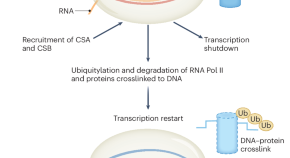
Adding a transcription-coupled repair pathway
When transcription by RNA polymerase II is stalled by ultraviolet-induced DNA damage, it recruits repair factors, leading to excision of the damaged site and DNA synthesis to fill the gap. Three new studies show that, for aldehyde-induced DNA crosslinks, repair is activated by the same factors, but without base excision and gap filling.
- Marco Saponaro
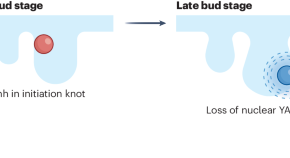
Tissue pressure and YAP during organogenesis
Organ morphogenesis begins with proliferation, which results in tissue pressures and site-specific YAP expression, nuclear translocation and signalling. A study now reports the involvement of anisotropy, localized pressure and YAP signalling in organizer-forming cascades, introducing a new chapter of molecular mechanobiology of organogenesis.
- Thomas G. H. Diekwisch
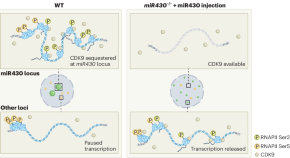
Transcriptional bodies manage tight resources
Eukaryotic transcriptional machinery often shows local enrichment in dynamic clusters at sites of high expression. A study of zebrafish embryos shows that such clusters can fine-tune the timing of zygotic genome activation by sequestering a component required for productive transcription, thus limiting its availability to other genes.
- Natalia Stec
- Adam Klosin
Related Subjects
- Cell division
- Chromosomes
- CRISPR-Cas systems
- DNA damage and repair
- DNA metabolism
- DNA recombination
- DNA replication
- Epigenetics
- Non-coding RNAs
- Nuclear organization
- Post-translational modifications
- Protein folding
- Proteolysis
- Riboswitches
- RNA metabolism
- Single-molecule biophysics
- Transcription
- Transcriptomics
- Translation
- Transposition
Latest Research and Reviews
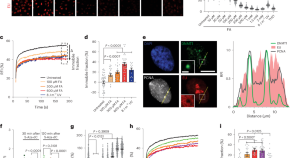
Transcription-coupled DNA–protein crosslink repair by CSB and CRL4 CSA -mediated degradation
Three studies identify a transcription-coupled DNA–protein crosslink repair pathway that depends on the Cockayne syndrome proteins and the proteasome.
- Marjolein van Sluis
- Jurgen A. Marteijn

Endogenous aldehyde-induced DNA–protein crosslinks are resolved by transcription-coupled repair
- Yasuyoshi Oka
- Yuka Nakazawa
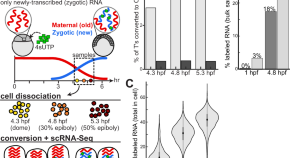
Cell-type-specific mRNA transcription and degradation kinetics in zebrafish embryogenesis from metabolically labeled single-cell RNA-seq
This study analyzes the embryonic replacement of maternally contributed mRNA with new mRNA in single cells and shows dynamic spatio-temporal regulation of maternal mRNA decay and cell-type specific retention within the earliest specified cell types in zebrafish embryos.
- Lior Fishman
- Avani Modak
- Michal Rabani

An in vitro CRISPR screen of cell-free DNA identifies apoptosis as the primary mediator of cell-free DNA release
A novel approach using whole-genome CRISPR-Cas9 screen indicates that apoptosis is the most important mediator of cfDNA release.
- Brad. A. Davidson
- Adam X. Miranda
- Ben Ho Park

Histone H1.0 couples cellular mechanical behaviors to chromatin structure
Hu et al. describe how histone H1.0 regulates myofibroblast activation, linking force generation to nuclear organization and gene transcription.
- Shuaishuai Hu
- Douglas J. Chapski
- Thomas M. Vondriska
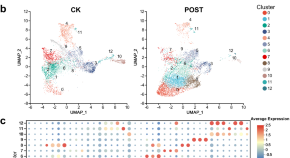
Single-cell and spatial RNA sequencing reveal the spatiotemporal trajectories of fruit senescence
Fruit senescence is a complex physiological process. Here, the authors construct a single-cell expression atlas of pitaya pericarp pitaya to provide a spatiotemporal perspective of the dynamic process of plant senescence.
- Robert Henry
News and Comment

Seeing transcription in real time
Imaging of fluorescently labelled nascent RNA in live cells enabled real-time observation of transcription of an endogenous gene.
- Tineke L. Lenstra
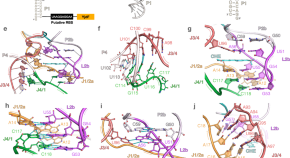
Structural basis for promiscuity in ligand recognition by yjdF riboswitch
- Daniel Krochmal
- Christina Roman
- Joseph A. Piccirilli
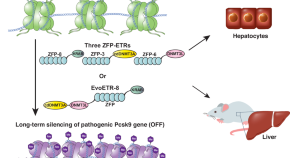
Persistent in vivo epigenetic silencing of Pcsk9
- Isabella R. Gengaro
Quick links
- Explore articles by subject
- Guide to authors
- Editorial policies

IMAGES
VIDEO
COMMENTS
Research Topics in Biology for Undergraduates. 41. Investigating the effects of pollutants on local plant species. Microbial diversity and ecosystem functioning in a specific habitat. Understanding the genetics of antibiotic resistance in bacteria. Impact of urbanization on bird populations and biodiversity. Investigating the role of pheromones ...
Molecular Biology Research Topics For Undergraduates. 31. Studying the structure and function of DNA and RNA molecules. 32. Analyzing the regulation of gene expression in eukaryotic cells. 33. Investigating the mechanisms of DNA replication and repair. 34. Studying the role of non-coding RNAs in gene regulation.
View the most relevant schools for your interests and compare them by tuition, programs, acceptance rate, and other factors important to finding your college home. The 10 Most Interesting Biological Research Fields ; #1, Johns Hopkins University Baltimore, MD ; #2, University of Pennsylvania Philadelphia, PA ; #3, Columbia University.
She is the winner of the 2015 Stony Brook Fiction Prize, and her short stories have been published in Mid-American Review, Cutbank, Sonora Review, New Orleans Review, and The Collagist, among other magazines. The 49 most interest biology research topics are explored. We also offer links to variety of resources for research topics in biology.
This study presents a new iPS cell-based model to study the mechanisms of tau propagation in 4R tauopathies. Kim Baumann Research Highlights 09 Apr 2024 Nature Reviews Molecular Cell Biology
Here are 212 biology research topics to help you get started. Toll-free: +1 (877) 401-4335. Order Now. About; Prices; Services How It Works; ... Create a survey amongst students of biology asking why they chose to study the course. Biology Research Topics For College Students. If you find any of the above beyond your intellectual and Research ...
To make things as simple as possible for you, we've put together a list of biology research project ideas. You will find 100 topics on various subjects below. Of course, you can use any of our topics for free. However, keep in mind that even though we are doing our best to maintain this list fresh, other students will find it as well.
Marine Biology Research Topics Marine biology relates to a mixture of Biology, Chemistry, and Physics as one studies marine organisms and their behavior patterns. As marine biologists study how they interact with the environment, they use oceanography and relevant skills based on Chemistry, Physics, and Geology.
Biology is a vast field of study that explores the diverse aspects of life, from the smallest organisms to the complex ecosystems they inhabit. With new discoveries being made every day, the field of biology is constantly evolving and expanding. As a result, there are numerous research topics within biology that can capture the imagination of students, researchers, and professionals alike.
Ocean acidification. Stem cell research and therapy. About pseudomonas aeruginosa. Comparative genomics. Molecular and genome evolution. Neurobiological explanation of sleep. Symbiosis in parasites. Modern technology and tools in the research of biology. Change in the behavior of animals due to climate change.
Here are 30 research ideas for high school students to stimulate inquiry and enhance their understanding of biological principles. 1. Genetics and Heredity: Understanding Life's Blueprint. Genetics and heredity are the foundation of life's diversity.
In this project, we will perform and systematic review and meta-analysis of fasting or diet-induced autophagy and its benefits on the body. You will gain skills in 1) searching and reviewing primary literature, 2) computational skills for performing data analysis (R language), and 3) writing your scientific findings.
Cell biology is the discipline of biological sciences that studies the structure, physiology, growth, reproduction and death of cells. Research in cell biology uses microscopic and molecular tools ...
Biology research covers the study of the origin, development, evolution, anatomy and physiology of all living organisms and their environment. This includes plants, animals, human beings, and the environment. If this is a field you're interested in, you'll find a vast array of biology research topics that you can choose from.
Here, the authors investigate associations of vitamin D metabolites with gut microbiome in a cross-sectional analysis of 567 elderly men enrolled in the Osteoporotic Fractures in Men (MrOS) Study ...
A case study on the biology of marine birds. New and Trendy Biology Research Topics. It's a good idea to keep up with the times when writing a biology research paper, so here's a list of some of the hottest biology topics right now. Understanding genetic drift. The complex process of DNA Replication. The importance of neurobiology.
Relevant Research Topics. Selective telomerase activation to delay senescence. Inhibition of mTOR gene and gene products for longevity of life. Effects of diet (caloric restriction) on lifespan. Effect of altered energy generation capacity (epigenetic changes) on the process of aging.
Texas Tech University's Research Program is pivotal in cultivating the next generation of scientists and healthcare professionals by providing high school students with university resources and mentorship. 11. University of Chicago's Research in the Biological Sciences. Location: University of Chicago.
Areas of Research. For over 50 years, we have played a central role in the growth of molecular life sciences and the revolution in molecular and cellular biology, genetics, genomics, and computational biology. Biochemistry, Biophysics, and Structural Biology. Cancer Biology. Cell Biology. Computational Biology. Genetics.
Welcome to SciTechDaily.com's Biology News page, your ultimate destination for the latest discoveries, breakthroughs, and advancements in the fascinating world of biology. Here, we cover a wide range of topics, from molecular biology and genetics to ecology and evolutionary studies, ensuring that our readers stay up-to-date with the most recent developments in this ever-evolving field.
Biology education research is an exciting field that allows students to learn more about effective teaching and learning in the context of biology topics they are learning about in their coursework. Students also develop scientific skills such as study design, data collection, statistical and/or qualitative analysis, and written and verbal ...
The idea of growing a functioning human brain-like tissues in a dish has always sounded pretty far-fetched, even to researchers in the field. Towards the future goal, a Japanese and French ...
Humans can increase biodiversity, archaeological study shows. ScienceDaily . Retrieved April 10, 2024 from www.sciencedaily.com / releases / 2024 / 04 / 240409124009.htm
Research has uncovered important new insights into the evolution of oxygen, carbon, and other vital elements over the entire history of Earth -- and it could help assess which other planets can ...
Top 50 Life and Biological Sciences Articles. We are pleased to share with you the 50 most read Nature Communications articles* in life and biological sciences published in 2019. Featuring authors ...
In a paper published in Nature in early 2020, Krasnow and his colleagues including then-graduate student Kyle Travaglini, PhD — who is also one of the new study's co-lead authors along with MD-PhD student Timothy Wu — described a technique they'd worked out for isolating fresh human lungs; dissociating the cells from one another; and characterizing them, one by one, on the basis of ...
Filling in genomic blanks for disease studies works better for some groups than others. Understanding how genetics affect health is an essential first step toward treating and preventing a host of ...
Published in the journal Nature Human Behaviour, the research encompassed 212 previously published studies and included a statistical analysis of 85 studies involving adults and 52 involving newborns.
Purdue expert: Cloud research; Billions of years ago, Venus may have had a key Earthlike feature (New York Times article, subscription required) Four EAPS professors chosen by NASA to study lunar science; Raining buckets and pouring plastics. Like a pearl forming around a speck of sand, clouds coalesce around motes of matter called nuclei.
Molecular Biology is the field of biology that studies the composition, structure and interactions of cellular molecules such as nucleic acids and proteins that carry out the biological processes ...